Effectiveness of Monetary Rewards in Enhancing Employee Motivation - Case Study on Strand Palace Hotel
VerifiedAdded on 2023/01/11
|27
|6026
|77
AI Summary
This research study analyzes the effectiveness of monetary rewards in enhancing employee motivation in an organization, with a case study on Strand Palace Hotel. It aims to understand the importance of monetary rewards, ways to implement them, and challenges faced in handling the monetary system of employees.
Contribute Materials
Your contribution can guide someone’s learning journey. Share your
documents today.
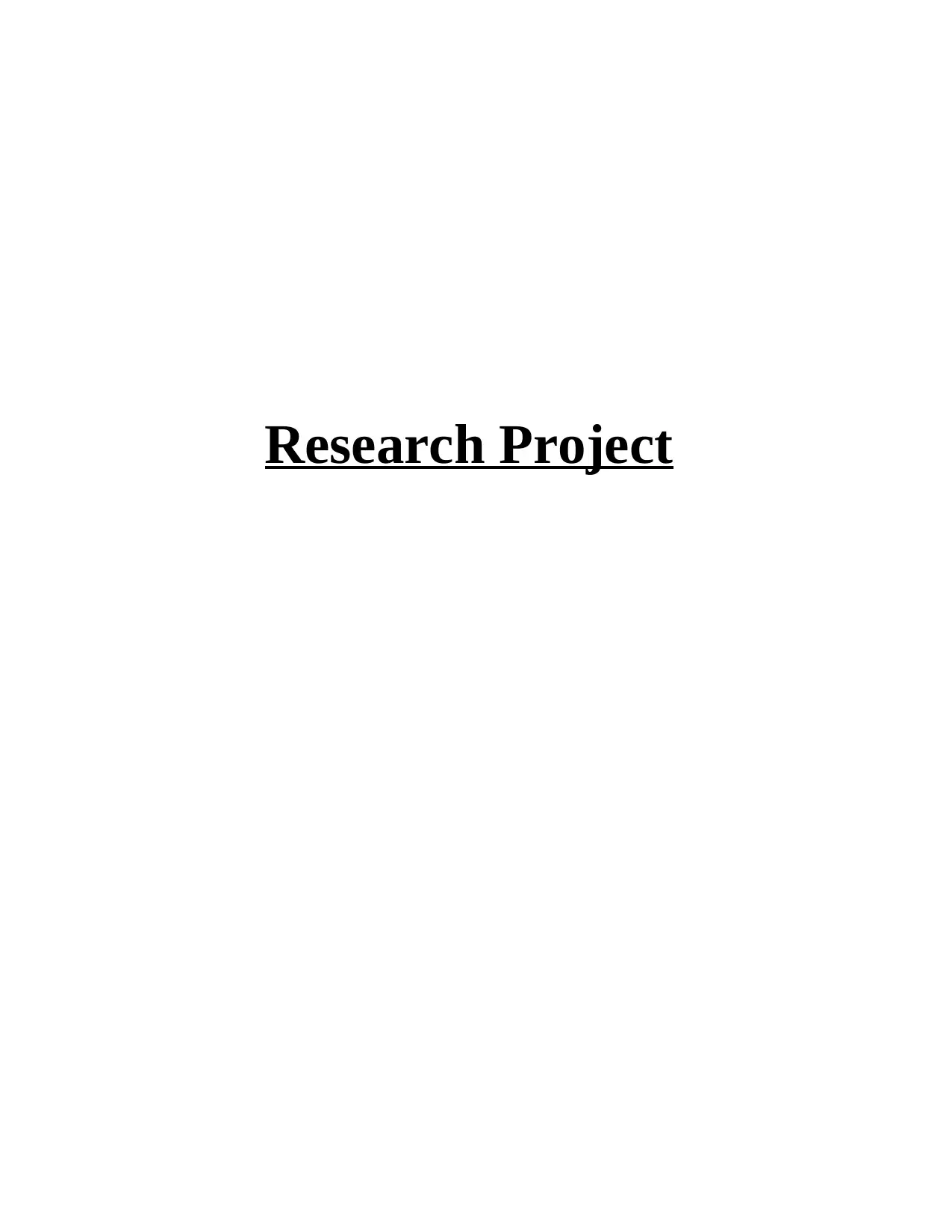
Research Project
Secure Best Marks with AI Grader
Need help grading? Try our AI Grader for instant feedback on your assignments.
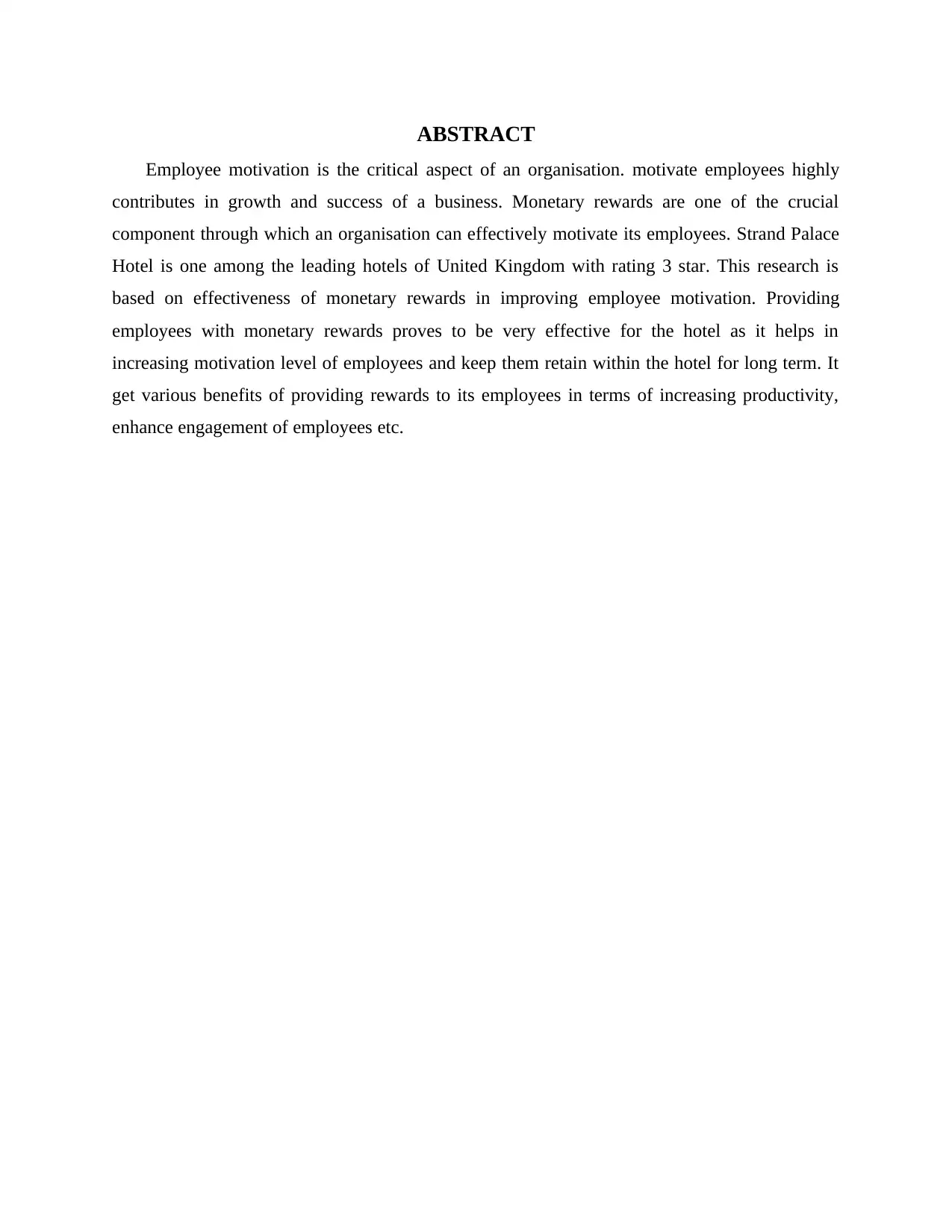
ABSTRACT
Employee motivation is the critical aspect of an organisation. motivate employees highly
contributes in growth and success of a business. Monetary rewards are one of the crucial
component through which an organisation can effectively motivate its employees. Strand Palace
Hotel is one among the leading hotels of United Kingdom with rating 3 star. This research is
based on effectiveness of monetary rewards in improving employee motivation. Providing
employees with monetary rewards proves to be very effective for the hotel as it helps in
increasing motivation level of employees and keep them retain within the hotel for long term. It
get various benefits of providing rewards to its employees in terms of increasing productivity,
enhance engagement of employees etc.
Employee motivation is the critical aspect of an organisation. motivate employees highly
contributes in growth and success of a business. Monetary rewards are one of the crucial
component through which an organisation can effectively motivate its employees. Strand Palace
Hotel is one among the leading hotels of United Kingdom with rating 3 star. This research is
based on effectiveness of monetary rewards in improving employee motivation. Providing
employees with monetary rewards proves to be very effective for the hotel as it helps in
increasing motivation level of employees and keep them retain within the hotel for long term. It
get various benefits of providing rewards to its employees in terms of increasing productivity,
enhance engagement of employees etc.
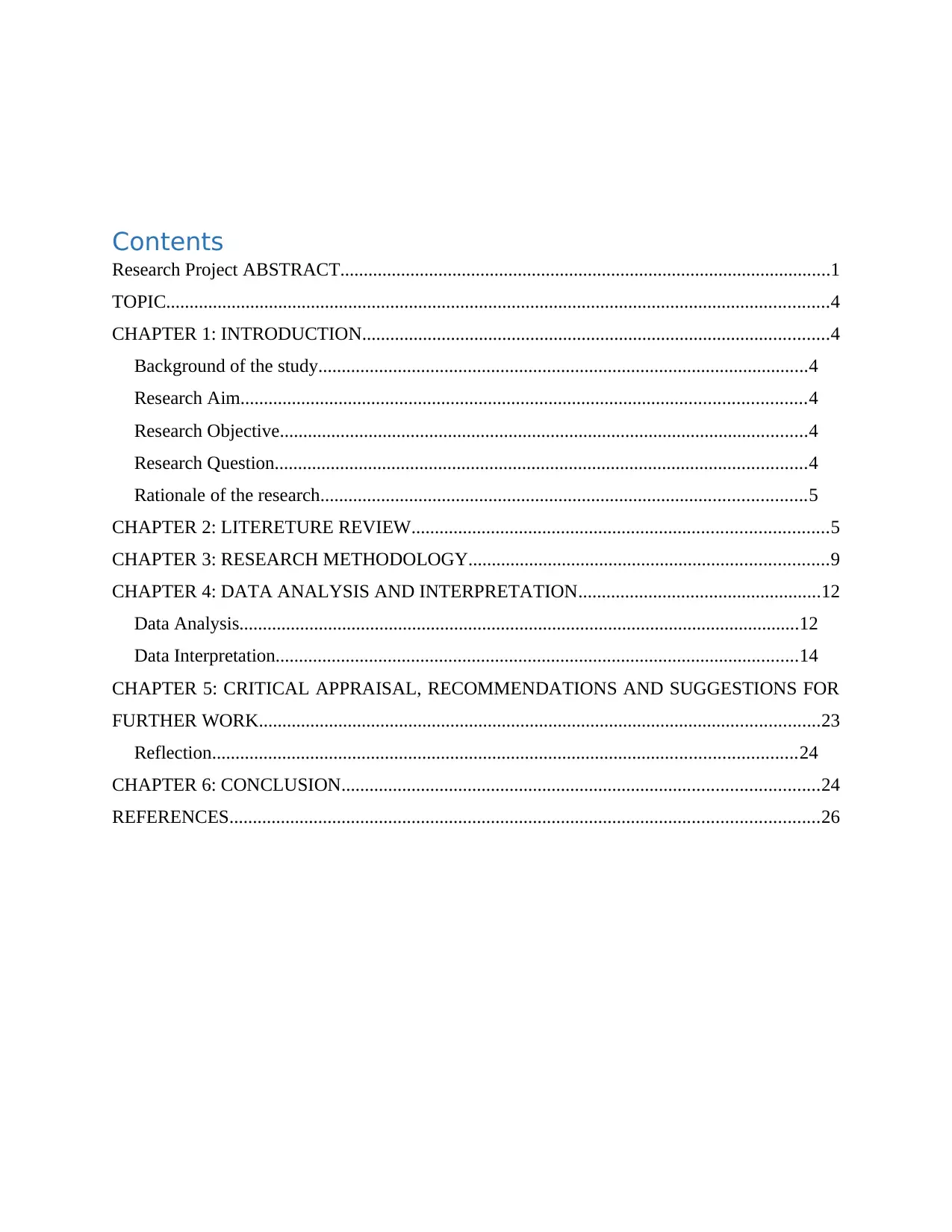
Contents
Research Project ABSTRACT.........................................................................................................1
TOPIC..............................................................................................................................................4
CHAPTER 1: INTRODUCTION....................................................................................................4
Background of the study.........................................................................................................4
Research Aim.........................................................................................................................4
Research Objective.................................................................................................................4
Research Question..................................................................................................................4
Rationale of the research........................................................................................................5
CHAPTER 2: LITERETURE REVIEW.........................................................................................5
CHAPTER 3: RESEARCH METHODOLOGY.............................................................................9
CHAPTER 4: DATA ANALYSIS AND INTERPRETATION....................................................12
Data Analysis........................................................................................................................12
Data Interpretation................................................................................................................14
CHAPTER 5: CRITICAL APPRAISAL, RECOMMENDATIONS AND SUGGESTIONS FOR
FURTHER WORK........................................................................................................................23
Reflection.............................................................................................................................24
CHAPTER 6: CONCLUSION......................................................................................................24
REFERENCES..............................................................................................................................26
Research Project ABSTRACT.........................................................................................................1
TOPIC..............................................................................................................................................4
CHAPTER 1: INTRODUCTION....................................................................................................4
Background of the study.........................................................................................................4
Research Aim.........................................................................................................................4
Research Objective.................................................................................................................4
Research Question..................................................................................................................4
Rationale of the research........................................................................................................5
CHAPTER 2: LITERETURE REVIEW.........................................................................................5
CHAPTER 3: RESEARCH METHODOLOGY.............................................................................9
CHAPTER 4: DATA ANALYSIS AND INTERPRETATION....................................................12
Data Analysis........................................................................................................................12
Data Interpretation................................................................................................................14
CHAPTER 5: CRITICAL APPRAISAL, RECOMMENDATIONS AND SUGGESTIONS FOR
FURTHER WORK........................................................................................................................23
Reflection.............................................................................................................................24
CHAPTER 6: CONCLUSION......................................................................................................24
REFERENCES..............................................................................................................................26
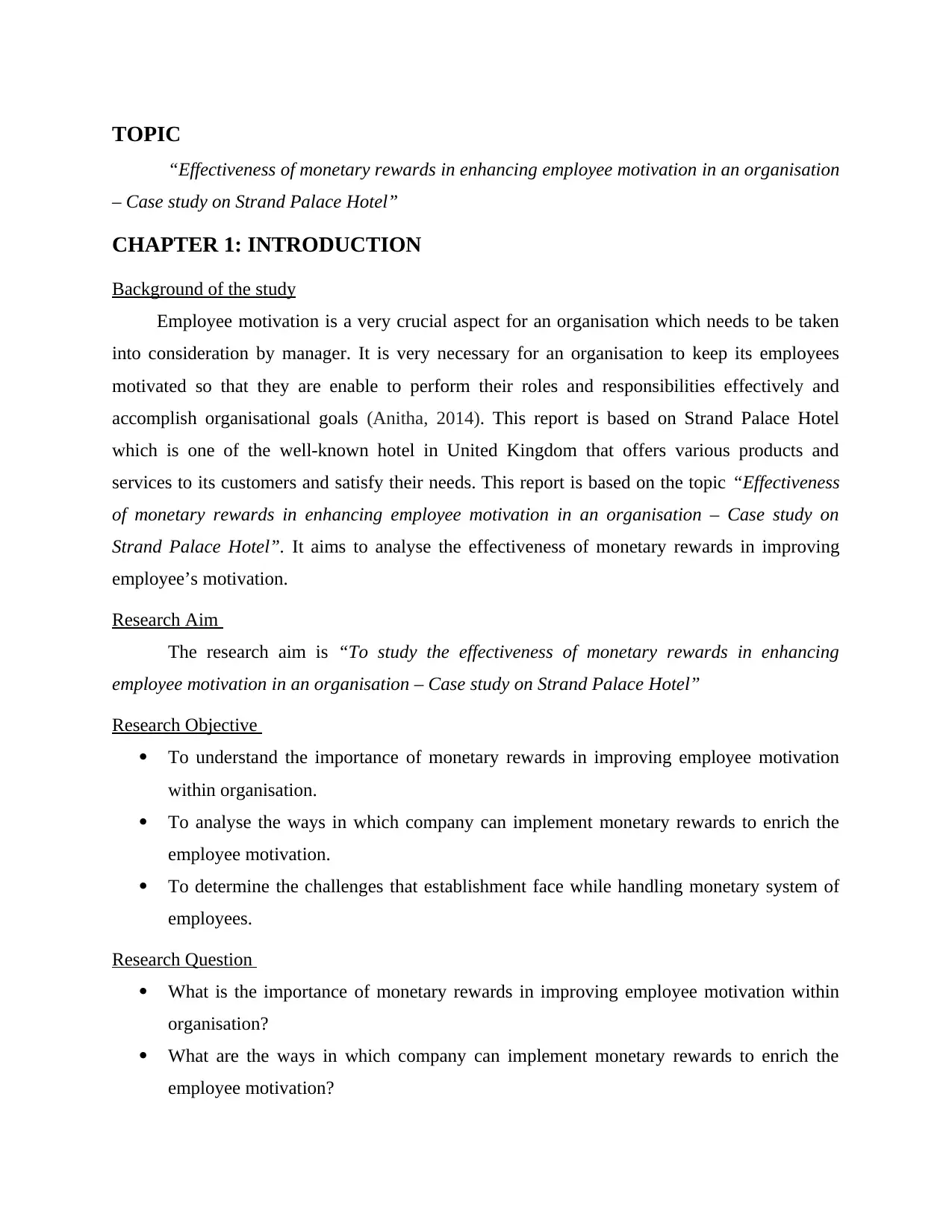
TOPIC
“Effectiveness of monetary rewards in enhancing employee motivation in an organisation
– Case study on Strand Palace Hotel”
CHAPTER 1: INTRODUCTION
Background of the study
Employee motivation is a very crucial aspect for an organisation which needs to be taken
into consideration by manager. It is very necessary for an organisation to keep its employees
motivated so that they are enable to perform their roles and responsibilities effectively and
accomplish organisational goals (Anitha, 2014). This report is based on Strand Palace Hotel
which is one of the well-known hotel in United Kingdom that offers various products and
services to its customers and satisfy their needs. This report is based on the topic “Effectiveness
of monetary rewards in enhancing employee motivation in an organisation – Case study on
Strand Palace Hotel”. It aims to analyse the effectiveness of monetary rewards in improving
employee’s motivation.
Research Aim
The research aim is “To study the effectiveness of monetary rewards in enhancing
employee motivation in an organisation – Case study on Strand Palace Hotel”
Research Objective
To understand the importance of monetary rewards in improving employee motivation
within organisation.
To analyse the ways in which company can implement monetary rewards to enrich the
employee motivation.
To determine the challenges that establishment face while handling monetary system of
employees.
Research Question
What is the importance of monetary rewards in improving employee motivation within
organisation?
What are the ways in which company can implement monetary rewards to enrich the
employee motivation?
“Effectiveness of monetary rewards in enhancing employee motivation in an organisation
– Case study on Strand Palace Hotel”
CHAPTER 1: INTRODUCTION
Background of the study
Employee motivation is a very crucial aspect for an organisation which needs to be taken
into consideration by manager. It is very necessary for an organisation to keep its employees
motivated so that they are enable to perform their roles and responsibilities effectively and
accomplish organisational goals (Anitha, 2014). This report is based on Strand Palace Hotel
which is one of the well-known hotel in United Kingdom that offers various products and
services to its customers and satisfy their needs. This report is based on the topic “Effectiveness
of monetary rewards in enhancing employee motivation in an organisation – Case study on
Strand Palace Hotel”. It aims to analyse the effectiveness of monetary rewards in improving
employee’s motivation.
Research Aim
The research aim is “To study the effectiveness of monetary rewards in enhancing
employee motivation in an organisation – Case study on Strand Palace Hotel”
Research Objective
To understand the importance of monetary rewards in improving employee motivation
within organisation.
To analyse the ways in which company can implement monetary rewards to enrich the
employee motivation.
To determine the challenges that establishment face while handling monetary system of
employees.
Research Question
What is the importance of monetary rewards in improving employee motivation within
organisation?
What are the ways in which company can implement monetary rewards to enrich the
employee motivation?
Secure Best Marks with AI Grader
Need help grading? Try our AI Grader for instant feedback on your assignments.
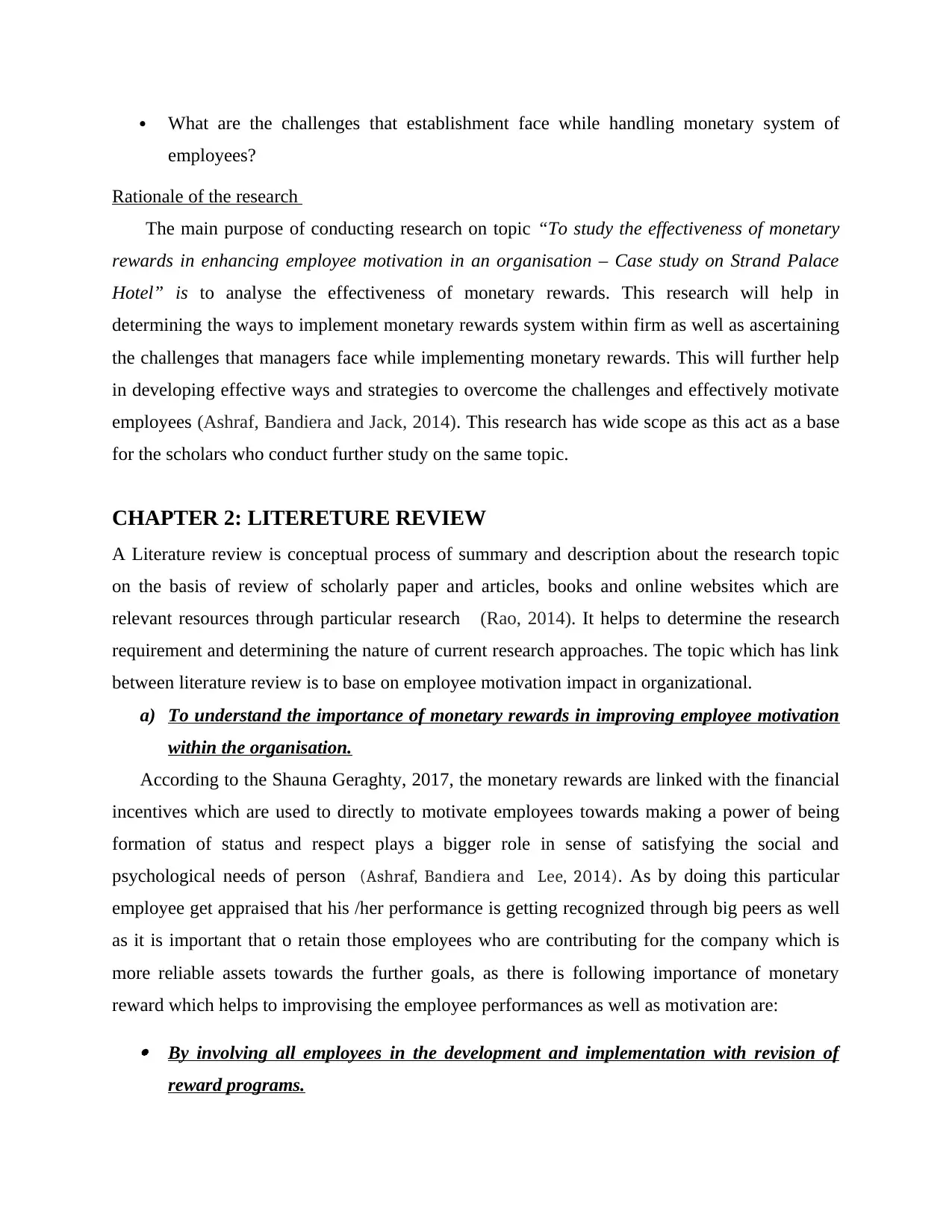
What are the challenges that establishment face while handling monetary system of
employees?
Rationale of the research
The main purpose of conducting research on topic “To study the effectiveness of monetary
rewards in enhancing employee motivation in an organisation – Case study on Strand Palace
Hotel” is to analyse the effectiveness of monetary rewards. This research will help in
determining the ways to implement monetary rewards system within firm as well as ascertaining
the challenges that managers face while implementing monetary rewards. This will further help
in developing effective ways and strategies to overcome the challenges and effectively motivate
employees (Ashraf, Bandiera and Jack, 2014). This research has wide scope as this act as a base
for the scholars who conduct further study on the same topic.
CHAPTER 2: LITERETURE REVIEW
A Literature review is conceptual process of summary and description about the research topic
on the basis of review of scholarly paper and articles, books and online websites which are
relevant resources through particular research (Rao, 2014). It helps to determine the research
requirement and determining the nature of current research approaches. The topic which has link
between literature review is to base on employee motivation impact in organizational.
a) To understand the importance of monetary rewards in improving employee motivation
within the organisation.
According to the Shauna Geraghty, 2017, the monetary rewards are linked with the financial
incentives which are used to directly to motivate employees towards making a power of being
formation of status and respect plays a bigger role in sense of satisfying the social and
psychological needs of person (Ashraf, Bandiera and Lee, 2014). As by doing this particular
employee get appraised that his /her performance is getting recognized through big peers as well
as it is important that o retain those employees who are contributing for the company which is
more reliable assets towards the further goals, as there is following importance of monetary
reward which helps to improvising the employee performances as well as motivation are:
By involving all employees in the development and implementation with revision of
reward programs.
employees?
Rationale of the research
The main purpose of conducting research on topic “To study the effectiveness of monetary
rewards in enhancing employee motivation in an organisation – Case study on Strand Palace
Hotel” is to analyse the effectiveness of monetary rewards. This research will help in
determining the ways to implement monetary rewards system within firm as well as ascertaining
the challenges that managers face while implementing monetary rewards. This will further help
in developing effective ways and strategies to overcome the challenges and effectively motivate
employees (Ashraf, Bandiera and Jack, 2014). This research has wide scope as this act as a base
for the scholars who conduct further study on the same topic.
CHAPTER 2: LITERETURE REVIEW
A Literature review is conceptual process of summary and description about the research topic
on the basis of review of scholarly paper and articles, books and online websites which are
relevant resources through particular research (Rao, 2014). It helps to determine the research
requirement and determining the nature of current research approaches. The topic which has link
between literature review is to base on employee motivation impact in organizational.
a) To understand the importance of monetary rewards in improving employee motivation
within the organisation.
According to the Shauna Geraghty, 2017, the monetary rewards are linked with the financial
incentives which are used to directly to motivate employees towards making a power of being
formation of status and respect plays a bigger role in sense of satisfying the social and
psychological needs of person (Ashraf, Bandiera and Lee, 2014). As by doing this particular
employee get appraised that his /her performance is getting recognized through big peers as well
as it is important that o retain those employees who are contributing for the company which is
more reliable assets towards the further goals, as there is following importance of monetary
reward which helps to improvising the employee performances as well as motivation are:
By involving all employees in the development and implementation with revision of
reward programs.
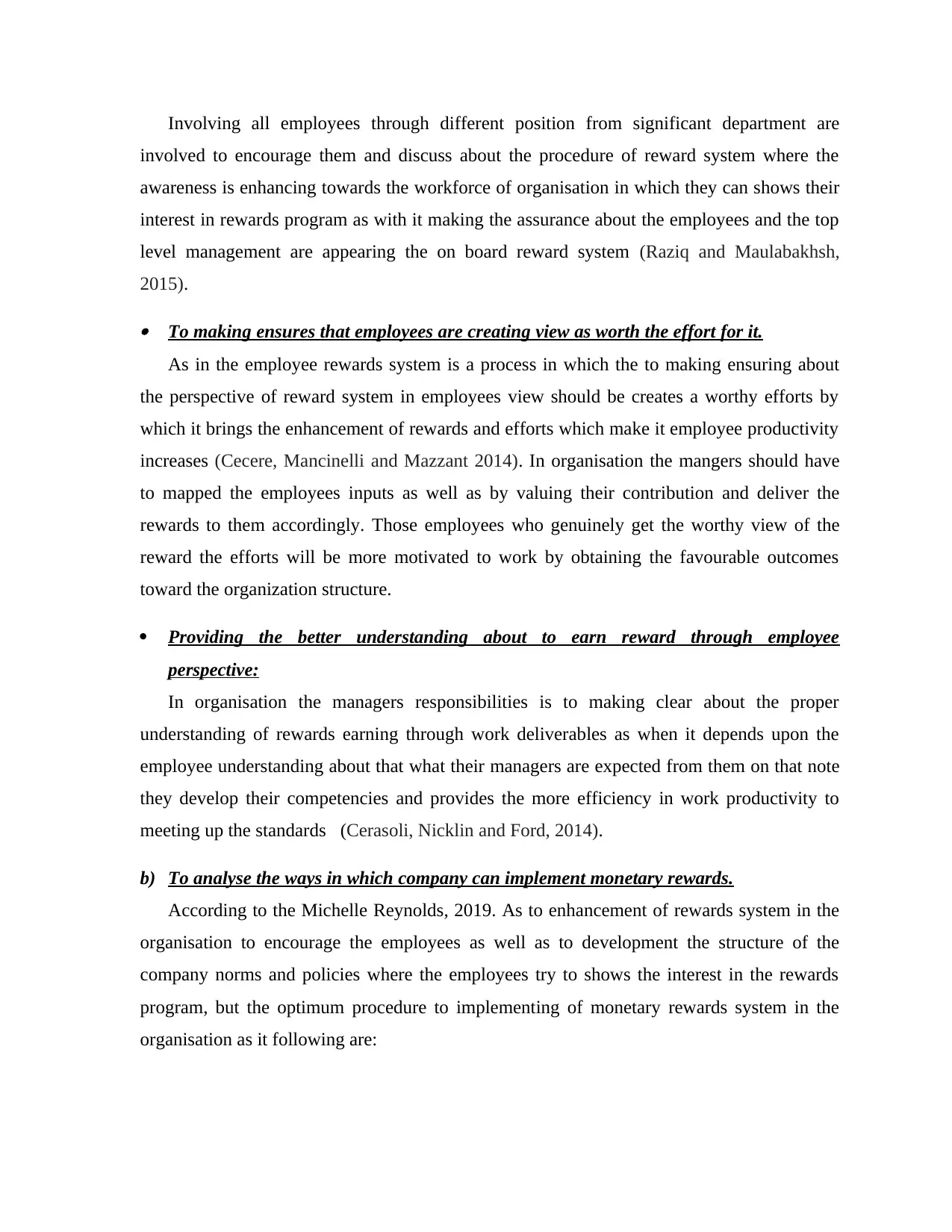
Involving all employees through different position from significant department are
involved to encourage them and discuss about the procedure of reward system where the
awareness is enhancing towards the workforce of organisation in which they can shows their
interest in rewards program as with it making the assurance about the employees and the top
level management are appearing the on board reward system (Raziq and Maulabakhsh,
2015).
To making ensures that employees are creating view as worth the effort for it.
As in the employee rewards system is a process in which the to making ensuring about
the perspective of reward system in employees view should be creates a worthy efforts by
which it brings the enhancement of rewards and efforts which make it employee productivity
increases (Cecere, Mancinelli and Mazzant 2014). In organisation the mangers should have
to mapped the employees inputs as well as by valuing their contribution and deliver the
rewards to them accordingly. Those employees who genuinely get the worthy view of the
reward the efforts will be more motivated to work by obtaining the favourable outcomes
toward the organization structure.
Providing the better understanding about to earn reward through employee
perspective:
In organisation the managers responsibilities is to making clear about the proper
understanding of rewards earning through work deliverables as when it depends upon the
employee understanding about that what their managers are expected from them on that note
they develop their competencies and provides the more efficiency in work productivity to
meeting up the standards (Cerasoli, Nicklin and Ford, 2014).
b) To analyse the ways in which company can implement monetary rewards.
According to the Michelle Reynolds, 2019. As to enhancement of rewards system in the
organisation to encourage the employees as well as to development the structure of the
company norms and policies where the employees try to shows the interest in the rewards
program, but the optimum procedure to implementing of monetary rewards system in the
organisation as it following are:
involved to encourage them and discuss about the procedure of reward system where the
awareness is enhancing towards the workforce of organisation in which they can shows their
interest in rewards program as with it making the assurance about the employees and the top
level management are appearing the on board reward system (Raziq and Maulabakhsh,
2015).
To making ensures that employees are creating view as worth the effort for it.
As in the employee rewards system is a process in which the to making ensuring about
the perspective of reward system in employees view should be creates a worthy efforts by
which it brings the enhancement of rewards and efforts which make it employee productivity
increases (Cecere, Mancinelli and Mazzant 2014). In organisation the mangers should have
to mapped the employees inputs as well as by valuing their contribution and deliver the
rewards to them accordingly. Those employees who genuinely get the worthy view of the
reward the efforts will be more motivated to work by obtaining the favourable outcomes
toward the organization structure.
Providing the better understanding about to earn reward through employee
perspective:
In organisation the managers responsibilities is to making clear about the proper
understanding of rewards earning through work deliverables as when it depends upon the
employee understanding about that what their managers are expected from them on that note
they develop their competencies and provides the more efficiency in work productivity to
meeting up the standards (Cerasoli, Nicklin and Ford, 2014).
b) To analyse the ways in which company can implement monetary rewards.
According to the Michelle Reynolds, 2019. As to enhancement of rewards system in the
organisation to encourage the employees as well as to development the structure of the
company norms and policies where the employees try to shows the interest in the rewards
program, but the optimum procedure to implementing of monetary rewards system in the
organisation as it following are:
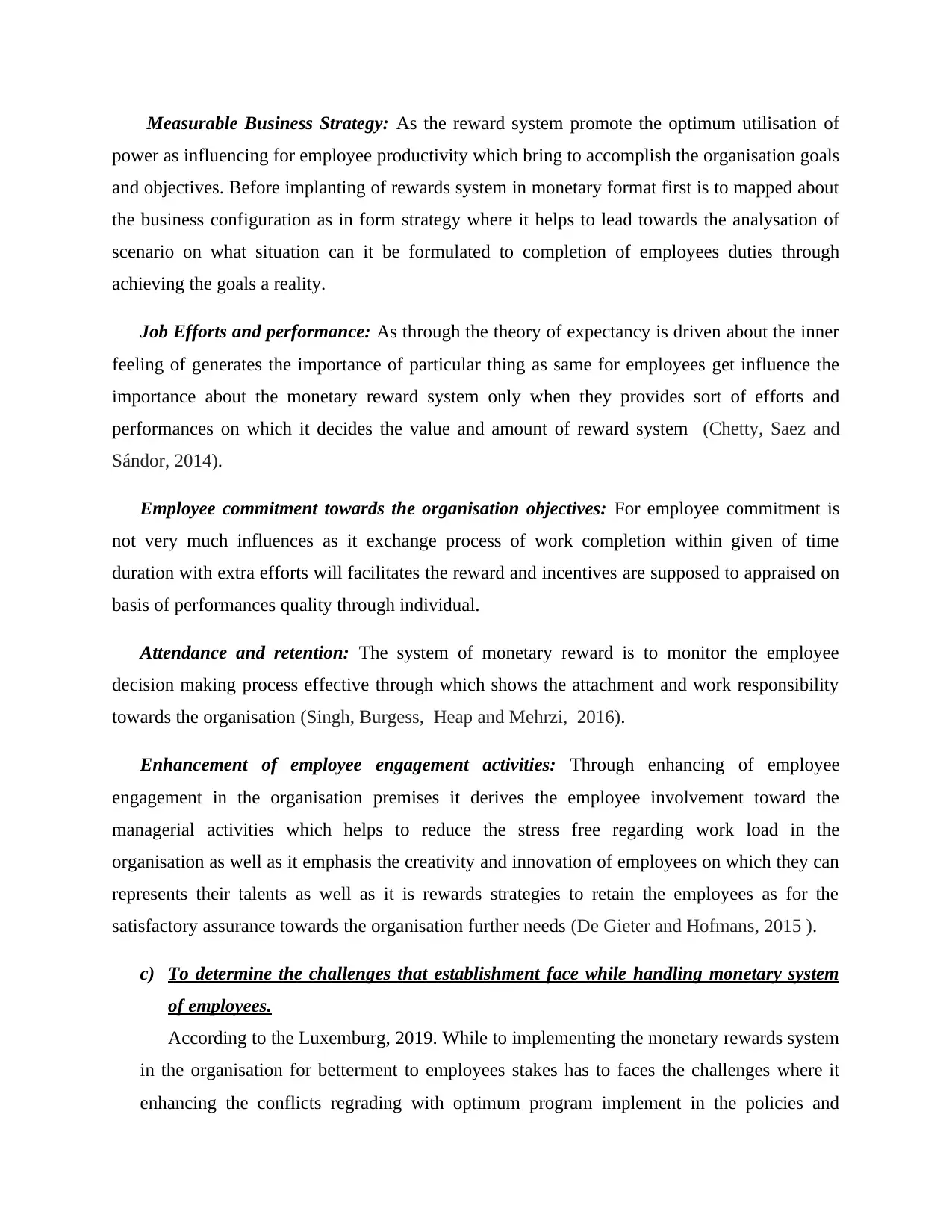
Measurable Business Strategy: As the reward system promote the optimum utilisation of
power as influencing for employee productivity which bring to accomplish the organisation goals
and objectives. Before implanting of rewards system in monetary format first is to mapped about
the business configuration as in form strategy where it helps to lead towards the analysation of
scenario on what situation can it be formulated to completion of employees duties through
achieving the goals a reality.
Job Efforts and performance: As through the theory of expectancy is driven about the inner
feeling of generates the importance of particular thing as same for employees get influence the
importance about the monetary reward system only when they provides sort of efforts and
performances on which it decides the value and amount of reward system (Chetty, Saez and
Sándor, 2014).
Employee commitment towards the organisation objectives: For employee commitment is
not very much influences as it exchange process of work completion within given of time
duration with extra efforts will facilitates the reward and incentives are supposed to appraised on
basis of performances quality through individual.
Attendance and retention: The system of monetary reward is to monitor the employee
decision making process effective through which shows the attachment and work responsibility
towards the organisation (Singh, Burgess, Heap and Mehrzi, 2016).
Enhancement of employee engagement activities: Through enhancing of employee
engagement in the organisation premises it derives the employee involvement toward the
managerial activities which helps to reduce the stress free regarding work load in the
organisation as well as it emphasis the creativity and innovation of employees on which they can
represents their talents as well as it is rewards strategies to retain the employees as for the
satisfactory assurance towards the organisation further needs (De Gieter and Hofmans, 2015 ).
c) To determine the challenges that establishment face while handling monetary system
of employees.
According to the Luxemburg, 2019. While to implementing the monetary rewards system
in the organisation for betterment to employees stakes has to faces the challenges where it
enhancing the conflicts regrading with optimum program implement in the policies and
power as influencing for employee productivity which bring to accomplish the organisation goals
and objectives. Before implanting of rewards system in monetary format first is to mapped about
the business configuration as in form strategy where it helps to lead towards the analysation of
scenario on what situation can it be formulated to completion of employees duties through
achieving the goals a reality.
Job Efforts and performance: As through the theory of expectancy is driven about the inner
feeling of generates the importance of particular thing as same for employees get influence the
importance about the monetary reward system only when they provides sort of efforts and
performances on which it decides the value and amount of reward system (Chetty, Saez and
Sándor, 2014).
Employee commitment towards the organisation objectives: For employee commitment is
not very much influences as it exchange process of work completion within given of time
duration with extra efforts will facilitates the reward and incentives are supposed to appraised on
basis of performances quality through individual.
Attendance and retention: The system of monetary reward is to monitor the employee
decision making process effective through which shows the attachment and work responsibility
towards the organisation (Singh, Burgess, Heap and Mehrzi, 2016).
Enhancement of employee engagement activities: Through enhancing of employee
engagement in the organisation premises it derives the employee involvement toward the
managerial activities which helps to reduce the stress free regarding work load in the
organisation as well as it emphasis the creativity and innovation of employees on which they can
represents their talents as well as it is rewards strategies to retain the employees as for the
satisfactory assurance towards the organisation further needs (De Gieter and Hofmans, 2015 ).
c) To determine the challenges that establishment face while handling monetary system
of employees.
According to the Luxemburg, 2019. While to implementing the monetary rewards system
in the organisation for betterment to employees stakes has to faces the challenges where it
enhancing the conflicts regrading with optimum program implement in the policies and
Paraphrase This Document
Need a fresh take? Get an instant paraphrase of this document with our AI Paraphraser
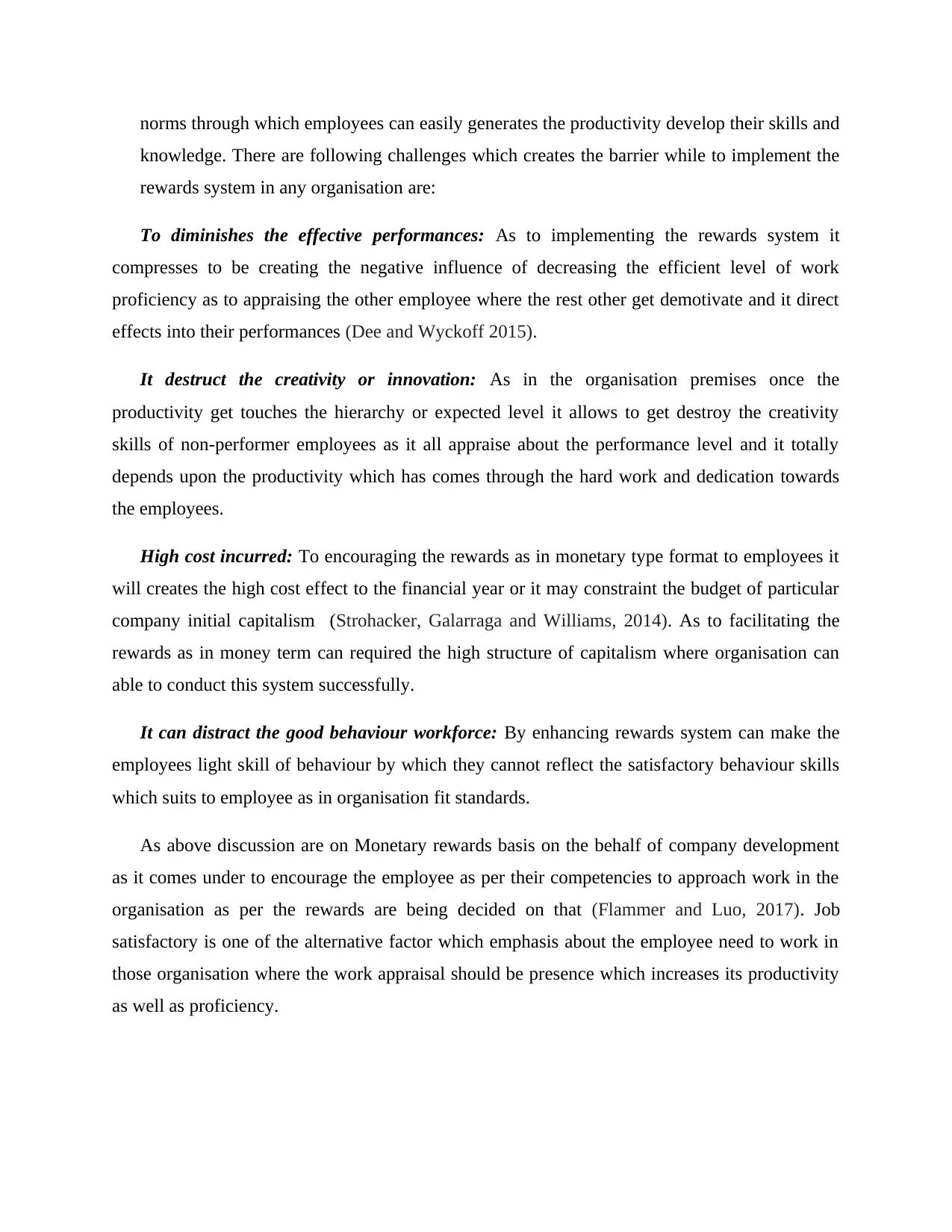
norms through which employees can easily generates the productivity develop their skills and
knowledge. There are following challenges which creates the barrier while to implement the
rewards system in any organisation are:
To diminishes the effective performances: As to implementing the rewards system it
compresses to be creating the negative influence of decreasing the efficient level of work
proficiency as to appraising the other employee where the rest other get demotivate and it direct
effects into their performances (Dee and Wyckoff 2015).
It destruct the creativity or innovation: As in the organisation premises once the
productivity get touches the hierarchy or expected level it allows to get destroy the creativity
skills of non-performer employees as it all appraise about the performance level and it totally
depends upon the productivity which has comes through the hard work and dedication towards
the employees.
High cost incurred: To encouraging the rewards as in monetary type format to employees it
will creates the high cost effect to the financial year or it may constraint the budget of particular
company initial capitalism (Strohacker, Galarraga and Williams, 2014). As to facilitating the
rewards as in money term can required the high structure of capitalism where organisation can
able to conduct this system successfully.
It can distract the good behaviour workforce: By enhancing rewards system can make the
employees light skill of behaviour by which they cannot reflect the satisfactory behaviour skills
which suits to employee as in organisation fit standards.
As above discussion are on Monetary rewards basis on the behalf of company development
as it comes under to encourage the employee as per their competencies to approach work in the
organisation as per the rewards are being decided on that (Flammer and Luo, 2017). Job
satisfactory is one of the alternative factor which emphasis about the employee need to work in
those organisation where the work appraisal should be presence which increases its productivity
as well as proficiency.
knowledge. There are following challenges which creates the barrier while to implement the
rewards system in any organisation are:
To diminishes the effective performances: As to implementing the rewards system it
compresses to be creating the negative influence of decreasing the efficient level of work
proficiency as to appraising the other employee where the rest other get demotivate and it direct
effects into their performances (Dee and Wyckoff 2015).
It destruct the creativity or innovation: As in the organisation premises once the
productivity get touches the hierarchy or expected level it allows to get destroy the creativity
skills of non-performer employees as it all appraise about the performance level and it totally
depends upon the productivity which has comes through the hard work and dedication towards
the employees.
High cost incurred: To encouraging the rewards as in monetary type format to employees it
will creates the high cost effect to the financial year or it may constraint the budget of particular
company initial capitalism (Strohacker, Galarraga and Williams, 2014). As to facilitating the
rewards as in money term can required the high structure of capitalism where organisation can
able to conduct this system successfully.
It can distract the good behaviour workforce: By enhancing rewards system can make the
employees light skill of behaviour by which they cannot reflect the satisfactory behaviour skills
which suits to employee as in organisation fit standards.
As above discussion are on Monetary rewards basis on the behalf of company development
as it comes under to encourage the employee as per their competencies to approach work in the
organisation as per the rewards are being decided on that (Flammer and Luo, 2017). Job
satisfactory is one of the alternative factor which emphasis about the employee need to work in
those organisation where the work appraisal should be presence which increases its productivity
as well as proficiency.
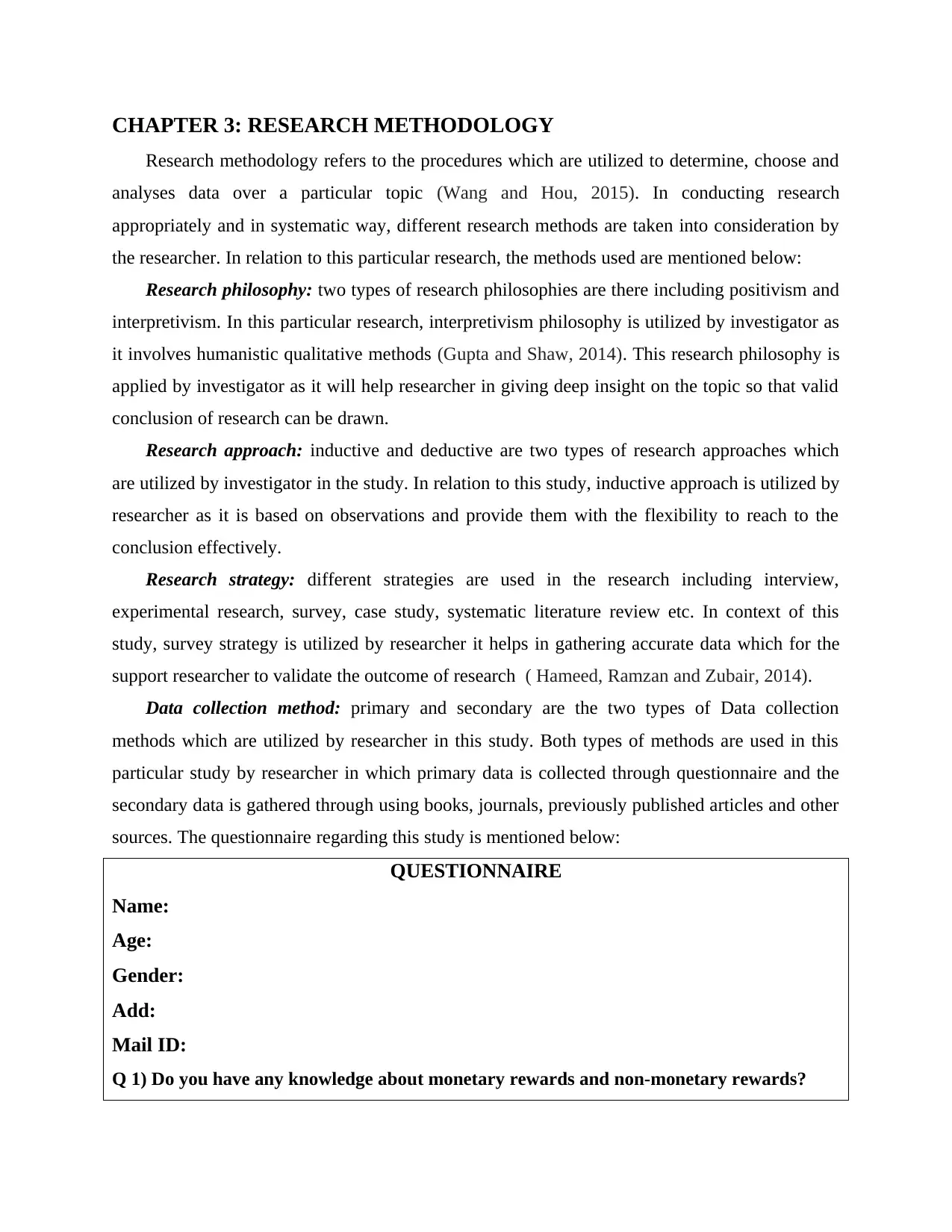
CHAPTER 3: RESEARCH METHODOLOGY
Research methodology refers to the procedures which are utilized to determine, choose and
analyses data over a particular topic (Wang and Hou, 2015). In conducting research
appropriately and in systematic way, different research methods are taken into consideration by
the researcher. In relation to this particular research, the methods used are mentioned below:
Research philosophy: two types of research philosophies are there including positivism and
interpretivism. In this particular research, interpretivism philosophy is utilized by investigator as
it involves humanistic qualitative methods (Gupta and Shaw, 2014). This research philosophy is
applied by investigator as it will help researcher in giving deep insight on the topic so that valid
conclusion of research can be drawn.
Research approach: inductive and deductive are two types of research approaches which
are utilized by investigator in the study. In relation to this study, inductive approach is utilized by
researcher as it is based on observations and provide them with the flexibility to reach to the
conclusion effectively.
Research strategy: different strategies are used in the research including interview,
experimental research, survey, case study, systematic literature review etc. In context of this
study, survey strategy is utilized by researcher it helps in gathering accurate data which for the
support researcher to validate the outcome of research ( Hameed, Ramzan and Zubair, 2014).
Data collection method: primary and secondary are the two types of Data collection
methods which are utilized by researcher in this study. Both types of methods are used in this
particular study by researcher in which primary data is collected through questionnaire and the
secondary data is gathered through using books, journals, previously published articles and other
sources. The questionnaire regarding this study is mentioned below:
QUESTIONNAIRE
Name:
Age:
Gender:
Add:
Mail ID:
Q 1) Do you have any knowledge about monetary rewards and non-monetary rewards?
Research methodology refers to the procedures which are utilized to determine, choose and
analyses data over a particular topic (Wang and Hou, 2015). In conducting research
appropriately and in systematic way, different research methods are taken into consideration by
the researcher. In relation to this particular research, the methods used are mentioned below:
Research philosophy: two types of research philosophies are there including positivism and
interpretivism. In this particular research, interpretivism philosophy is utilized by investigator as
it involves humanistic qualitative methods (Gupta and Shaw, 2014). This research philosophy is
applied by investigator as it will help researcher in giving deep insight on the topic so that valid
conclusion of research can be drawn.
Research approach: inductive and deductive are two types of research approaches which
are utilized by investigator in the study. In relation to this study, inductive approach is utilized by
researcher as it is based on observations and provide them with the flexibility to reach to the
conclusion effectively.
Research strategy: different strategies are used in the research including interview,
experimental research, survey, case study, systematic literature review etc. In context of this
study, survey strategy is utilized by researcher it helps in gathering accurate data which for the
support researcher to validate the outcome of research ( Hameed, Ramzan and Zubair, 2014).
Data collection method: primary and secondary are the two types of Data collection
methods which are utilized by researcher in this study. Both types of methods are used in this
particular study by researcher in which primary data is collected through questionnaire and the
secondary data is gathered through using books, journals, previously published articles and other
sources. The questionnaire regarding this study is mentioned below:
QUESTIONNAIRE
Name:
Age:
Gender:
Add:
Mail ID:
Q 1) Do you have any knowledge about monetary rewards and non-monetary rewards?
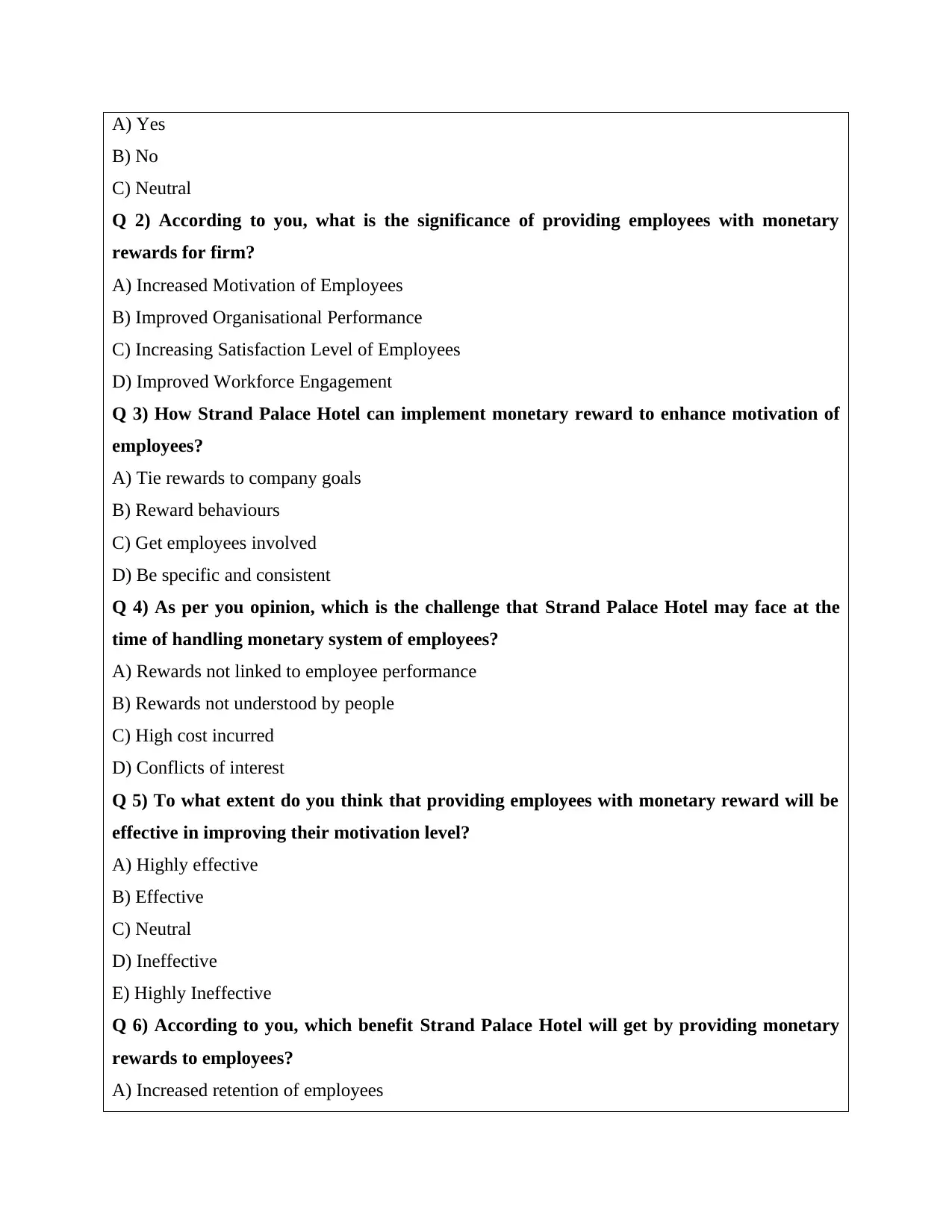
A) Yes
B) No
C) Neutral
Q 2) According to you, what is the significance of providing employees with monetary
rewards for firm?
A) Increased Motivation of Employees
B) Improved Organisational Performance
C) Increasing Satisfaction Level of Employees
D) Improved Workforce Engagement
Q 3) How Strand Palace Hotel can implement monetary reward to enhance motivation of
employees?
A) Tie rewards to company goals
B) Reward behaviours
C) Get employees involved
D) Be specific and consistent
Q 4) As per you opinion, which is the challenge that Strand Palace Hotel may face at the
time of handling monetary system of employees?
A) Rewards not linked to employee performance
B) Rewards not understood by people
C) High cost incurred
D) Conflicts of interest
Q 5) To what extent do you think that providing employees with monetary reward will be
effective in improving their motivation level?
A) Highly effective
B) Effective
C) Neutral
D) Ineffective
E) Highly Ineffective
Q 6) According to you, which benefit Strand Palace Hotel will get by providing monetary
rewards to employees?
A) Increased retention of employees
B) No
C) Neutral
Q 2) According to you, what is the significance of providing employees with monetary
rewards for firm?
A) Increased Motivation of Employees
B) Improved Organisational Performance
C) Increasing Satisfaction Level of Employees
D) Improved Workforce Engagement
Q 3) How Strand Palace Hotel can implement monetary reward to enhance motivation of
employees?
A) Tie rewards to company goals
B) Reward behaviours
C) Get employees involved
D) Be specific and consistent
Q 4) As per you opinion, which is the challenge that Strand Palace Hotel may face at the
time of handling monetary system of employees?
A) Rewards not linked to employee performance
B) Rewards not understood by people
C) High cost incurred
D) Conflicts of interest
Q 5) To what extent do you think that providing employees with monetary reward will be
effective in improving their motivation level?
A) Highly effective
B) Effective
C) Neutral
D) Ineffective
E) Highly Ineffective
Q 6) According to you, which benefit Strand Palace Hotel will get by providing monetary
rewards to employees?
A) Increased retention of employees
Secure Best Marks with AI Grader
Need help grading? Try our AI Grader for instant feedback on your assignments.
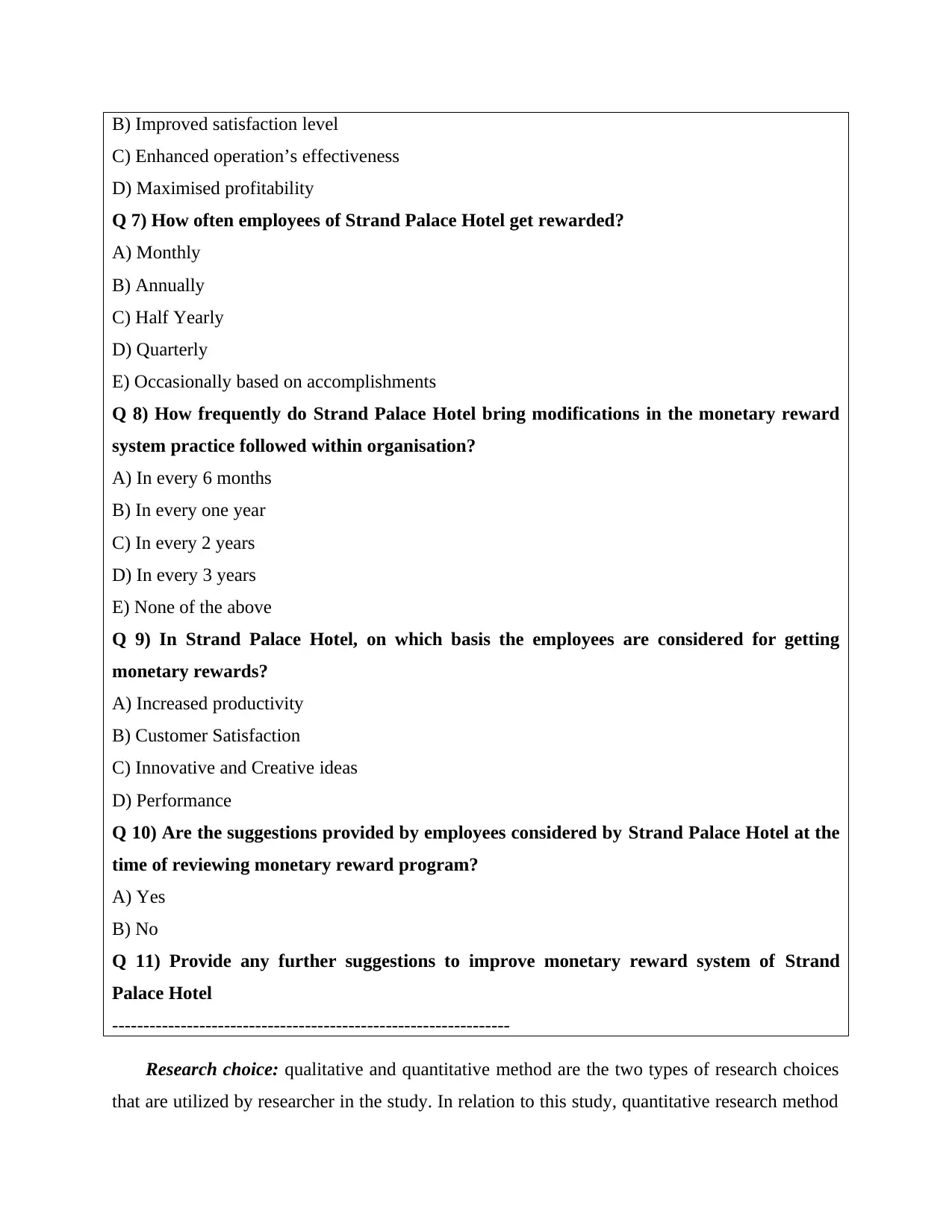
B) Improved satisfaction level
C) Enhanced operation’s effectiveness
D) Maximised profitability
Q 7) How often employees of Strand Palace Hotel get rewarded?
A) Monthly
B) Annually
C) Half Yearly
D) Quarterly
E) Occasionally based on accomplishments
Q 8) How frequently do Strand Palace Hotel bring modifications in the monetary reward
system practice followed within organisation?
A) In every 6 months
B) In every one year
C) In every 2 years
D) In every 3 years
E) None of the above
Q 9) In Strand Palace Hotel, on which basis the employees are considered for getting
monetary rewards?
A) Increased productivity
B) Customer Satisfaction
C) Innovative and Creative ideas
D) Performance
Q 10) Are the suggestions provided by employees considered by Strand Palace Hotel at the
time of reviewing monetary reward program?
A) Yes
B) No
Q 11) Provide any further suggestions to improve monetary reward system of Strand
Palace Hotel
----------------------------------------------------------------
Research choice: qualitative and quantitative method are the two types of research choices
that are utilized by researcher in the study. In relation to this study, quantitative research method
C) Enhanced operation’s effectiveness
D) Maximised profitability
Q 7) How often employees of Strand Palace Hotel get rewarded?
A) Monthly
B) Annually
C) Half Yearly
D) Quarterly
E) Occasionally based on accomplishments
Q 8) How frequently do Strand Palace Hotel bring modifications in the monetary reward
system practice followed within organisation?
A) In every 6 months
B) In every one year
C) In every 2 years
D) In every 3 years
E) None of the above
Q 9) In Strand Palace Hotel, on which basis the employees are considered for getting
monetary rewards?
A) Increased productivity
B) Customer Satisfaction
C) Innovative and Creative ideas
D) Performance
Q 10) Are the suggestions provided by employees considered by Strand Palace Hotel at the
time of reviewing monetary reward program?
A) Yes
B) No
Q 11) Provide any further suggestions to improve monetary reward system of Strand
Palace Hotel
----------------------------------------------------------------
Research choice: qualitative and quantitative method are the two types of research choices
that are utilized by researcher in the study. In relation to this study, quantitative research method
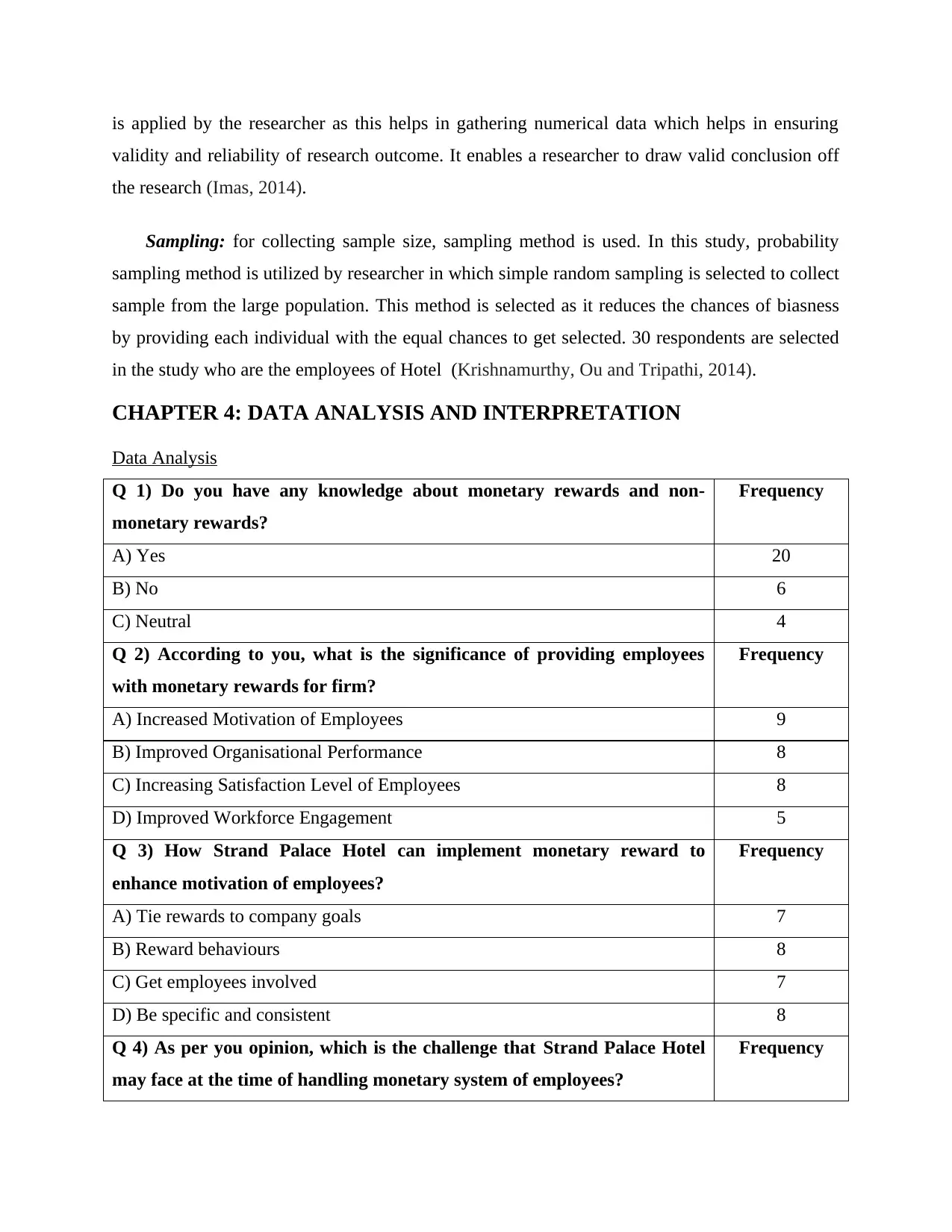
is applied by the researcher as this helps in gathering numerical data which helps in ensuring
validity and reliability of research outcome. It enables a researcher to draw valid conclusion off
the research (Imas, 2014).
Sampling: for collecting sample size, sampling method is used. In this study, probability
sampling method is utilized by researcher in which simple random sampling is selected to collect
sample from the large population. This method is selected as it reduces the chances of biasness
by providing each individual with the equal chances to get selected. 30 respondents are selected
in the study who are the employees of Hotel (Krishnamurthy, Ou and Tripathi, 2014).
CHAPTER 4: DATA ANALYSIS AND INTERPRETATION
Data Analysis
Q 1) Do you have any knowledge about monetary rewards and non-
monetary rewards?
Frequency
A) Yes 20
B) No 6
C) Neutral 4
Q 2) According to you, what is the significance of providing employees
with monetary rewards for firm?
Frequency
A) Increased Motivation of Employees 9
B) Improved Organisational Performance 8
C) Increasing Satisfaction Level of Employees 8
D) Improved Workforce Engagement 5
Q 3) How Strand Palace Hotel can implement monetary reward to
enhance motivation of employees?
Frequency
A) Tie rewards to company goals 7
B) Reward behaviours 8
C) Get employees involved 7
D) Be specific and consistent 8
Q 4) As per you opinion, which is the challenge that Strand Palace Hotel
may face at the time of handling monetary system of employees?
Frequency
validity and reliability of research outcome. It enables a researcher to draw valid conclusion off
the research (Imas, 2014).
Sampling: for collecting sample size, sampling method is used. In this study, probability
sampling method is utilized by researcher in which simple random sampling is selected to collect
sample from the large population. This method is selected as it reduces the chances of biasness
by providing each individual with the equal chances to get selected. 30 respondents are selected
in the study who are the employees of Hotel (Krishnamurthy, Ou and Tripathi, 2014).
CHAPTER 4: DATA ANALYSIS AND INTERPRETATION
Data Analysis
Q 1) Do you have any knowledge about monetary rewards and non-
monetary rewards?
Frequency
A) Yes 20
B) No 6
C) Neutral 4
Q 2) According to you, what is the significance of providing employees
with monetary rewards for firm?
Frequency
A) Increased Motivation of Employees 9
B) Improved Organisational Performance 8
C) Increasing Satisfaction Level of Employees 8
D) Improved Workforce Engagement 5
Q 3) How Strand Palace Hotel can implement monetary reward to
enhance motivation of employees?
Frequency
A) Tie rewards to company goals 7
B) Reward behaviours 8
C) Get employees involved 7
D) Be specific and consistent 8
Q 4) As per you opinion, which is the challenge that Strand Palace Hotel
may face at the time of handling monetary system of employees?
Frequency
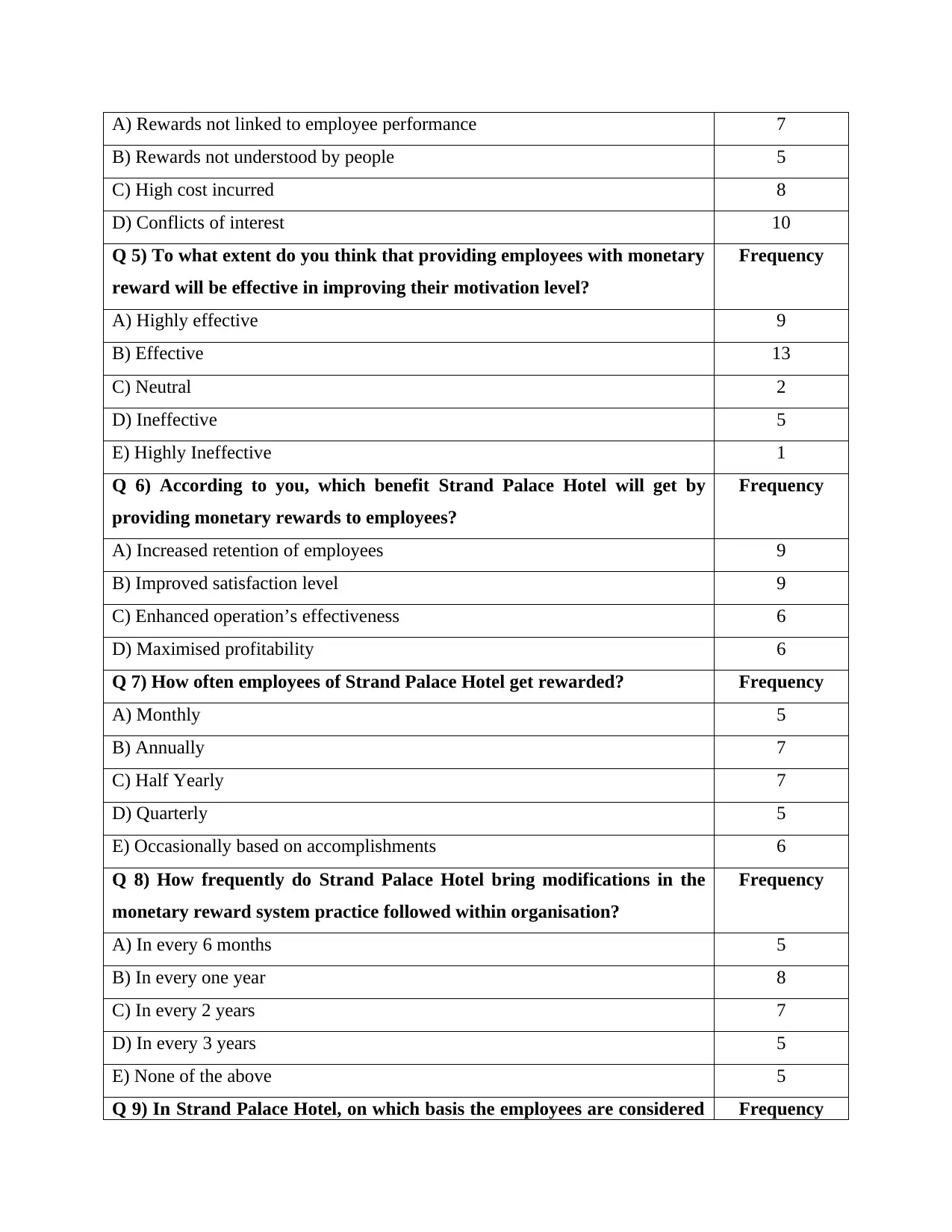
A) Rewards not linked to employee performance 7
B) Rewards not understood by people 5
C) High cost incurred 8
D) Conflicts of interest 10
Q 5) To what extent do you think that providing employees with monetary
reward will be effective in improving their motivation level?
Frequency
A) Highly effective 9
B) Effective 13
C) Neutral 2
D) Ineffective 5
E) Highly Ineffective 1
Q 6) According to you, which benefit Strand Palace Hotel will get by
providing monetary rewards to employees?
Frequency
A) Increased retention of employees 9
B) Improved satisfaction level 9
C) Enhanced operation’s effectiveness 6
D) Maximised profitability 6
Q 7) How often employees of Strand Palace Hotel get rewarded? Frequency
A) Monthly 5
B) Annually 7
C) Half Yearly 7
D) Quarterly 5
E) Occasionally based on accomplishments 6
Q 8) How frequently do Strand Palace Hotel bring modifications in the
monetary reward system practice followed within organisation?
Frequency
A) In every 6 months 5
B) In every one year 8
C) In every 2 years 7
D) In every 3 years 5
E) None of the above 5
Q 9) In Strand Palace Hotel, on which basis the employees are considered Frequency
B) Rewards not understood by people 5
C) High cost incurred 8
D) Conflicts of interest 10
Q 5) To what extent do you think that providing employees with monetary
reward will be effective in improving their motivation level?
Frequency
A) Highly effective 9
B) Effective 13
C) Neutral 2
D) Ineffective 5
E) Highly Ineffective 1
Q 6) According to you, which benefit Strand Palace Hotel will get by
providing monetary rewards to employees?
Frequency
A) Increased retention of employees 9
B) Improved satisfaction level 9
C) Enhanced operation’s effectiveness 6
D) Maximised profitability 6
Q 7) How often employees of Strand Palace Hotel get rewarded? Frequency
A) Monthly 5
B) Annually 7
C) Half Yearly 7
D) Quarterly 5
E) Occasionally based on accomplishments 6
Q 8) How frequently do Strand Palace Hotel bring modifications in the
monetary reward system practice followed within organisation?
Frequency
A) In every 6 months 5
B) In every one year 8
C) In every 2 years 7
D) In every 3 years 5
E) None of the above 5
Q 9) In Strand Palace Hotel, on which basis the employees are considered Frequency
Paraphrase This Document
Need a fresh take? Get an instant paraphrase of this document with our AI Paraphraser
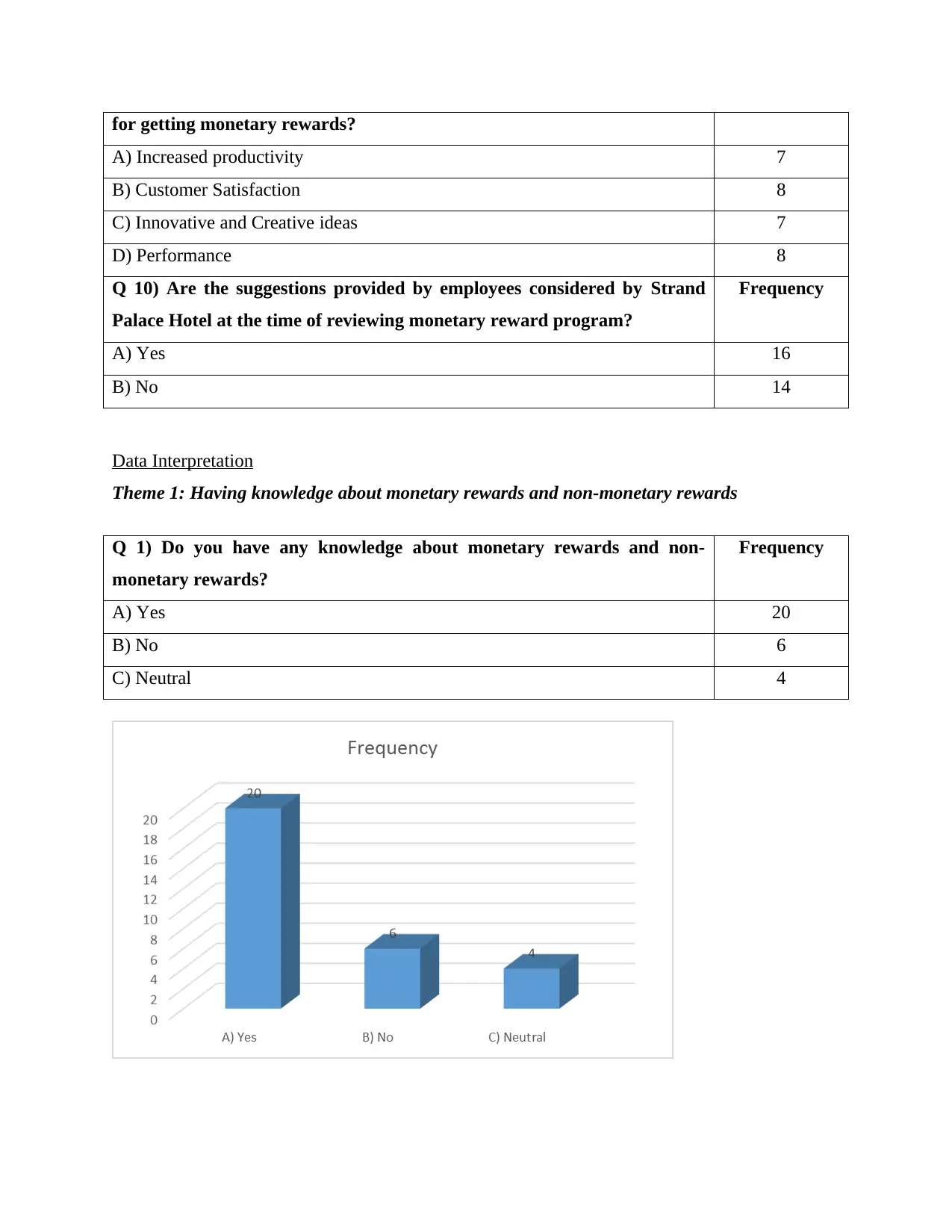
for getting monetary rewards?
A) Increased productivity 7
B) Customer Satisfaction 8
C) Innovative and Creative ideas 7
D) Performance 8
Q 10) Are the suggestions provided by employees considered by Strand
Palace Hotel at the time of reviewing monetary reward program?
Frequency
A) Yes 16
B) No 14
Data Interpretation
Theme 1: Having knowledge about monetary rewards and non-monetary rewards
Q 1) Do you have any knowledge about monetary rewards and non-
monetary rewards?
Frequency
A) Yes 20
B) No 6
C) Neutral 4
A) Increased productivity 7
B) Customer Satisfaction 8
C) Innovative and Creative ideas 7
D) Performance 8
Q 10) Are the suggestions provided by employees considered by Strand
Palace Hotel at the time of reviewing monetary reward program?
Frequency
A) Yes 16
B) No 14
Data Interpretation
Theme 1: Having knowledge about monetary rewards and non-monetary rewards
Q 1) Do you have any knowledge about monetary rewards and non-
monetary rewards?
Frequency
A) Yes 20
B) No 6
C) Neutral 4
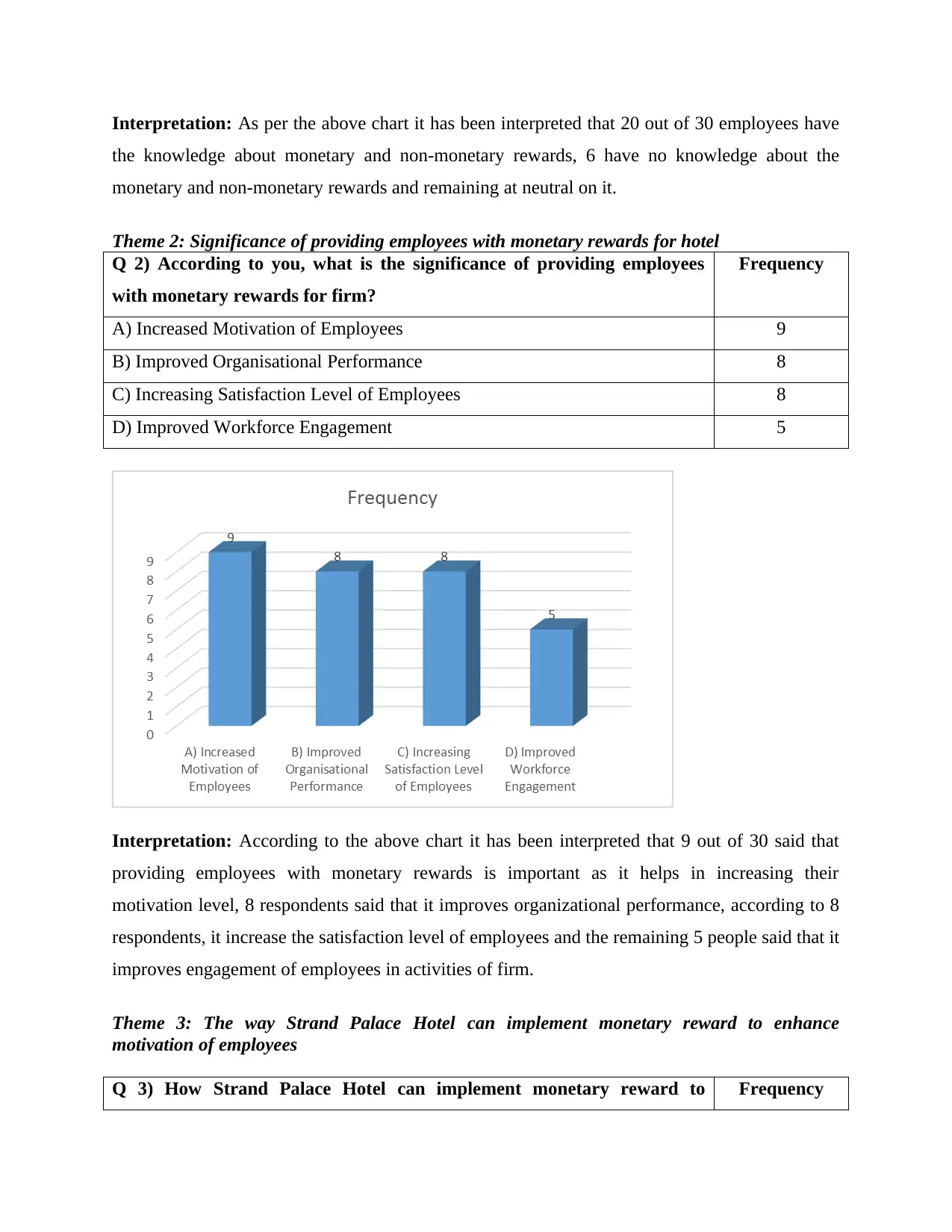
Interpretation: As per the above chart it has been interpreted that 20 out of 30 employees have
the knowledge about monetary and non-monetary rewards, 6 have no knowledge about the
monetary and non-monetary rewards and remaining at neutral on it.
Theme 2: Significance of providing employees with monetary rewards for hotel
Q 2) According to you, what is the significance of providing employees
with monetary rewards for firm?
Frequency
A) Increased Motivation of Employees 9
B) Improved Organisational Performance 8
C) Increasing Satisfaction Level of Employees 8
D) Improved Workforce Engagement 5
Interpretation: According to the above chart it has been interpreted that 9 out of 30 said that
providing employees with monetary rewards is important as it helps in increasing their
motivation level, 8 respondents said that it improves organizational performance, according to 8
respondents, it increase the satisfaction level of employees and the remaining 5 people said that it
improves engagement of employees in activities of firm.
Theme 3: The way Strand Palace Hotel can implement monetary reward to enhance
motivation of employees
Q 3) How Strand Palace Hotel can implement monetary reward to Frequency
the knowledge about monetary and non-monetary rewards, 6 have no knowledge about the
monetary and non-monetary rewards and remaining at neutral on it.
Theme 2: Significance of providing employees with monetary rewards for hotel
Q 2) According to you, what is the significance of providing employees
with monetary rewards for firm?
Frequency
A) Increased Motivation of Employees 9
B) Improved Organisational Performance 8
C) Increasing Satisfaction Level of Employees 8
D) Improved Workforce Engagement 5
Interpretation: According to the above chart it has been interpreted that 9 out of 30 said that
providing employees with monetary rewards is important as it helps in increasing their
motivation level, 8 respondents said that it improves organizational performance, according to 8
respondents, it increase the satisfaction level of employees and the remaining 5 people said that it
improves engagement of employees in activities of firm.
Theme 3: The way Strand Palace Hotel can implement monetary reward to enhance
motivation of employees
Q 3) How Strand Palace Hotel can implement monetary reward to Frequency
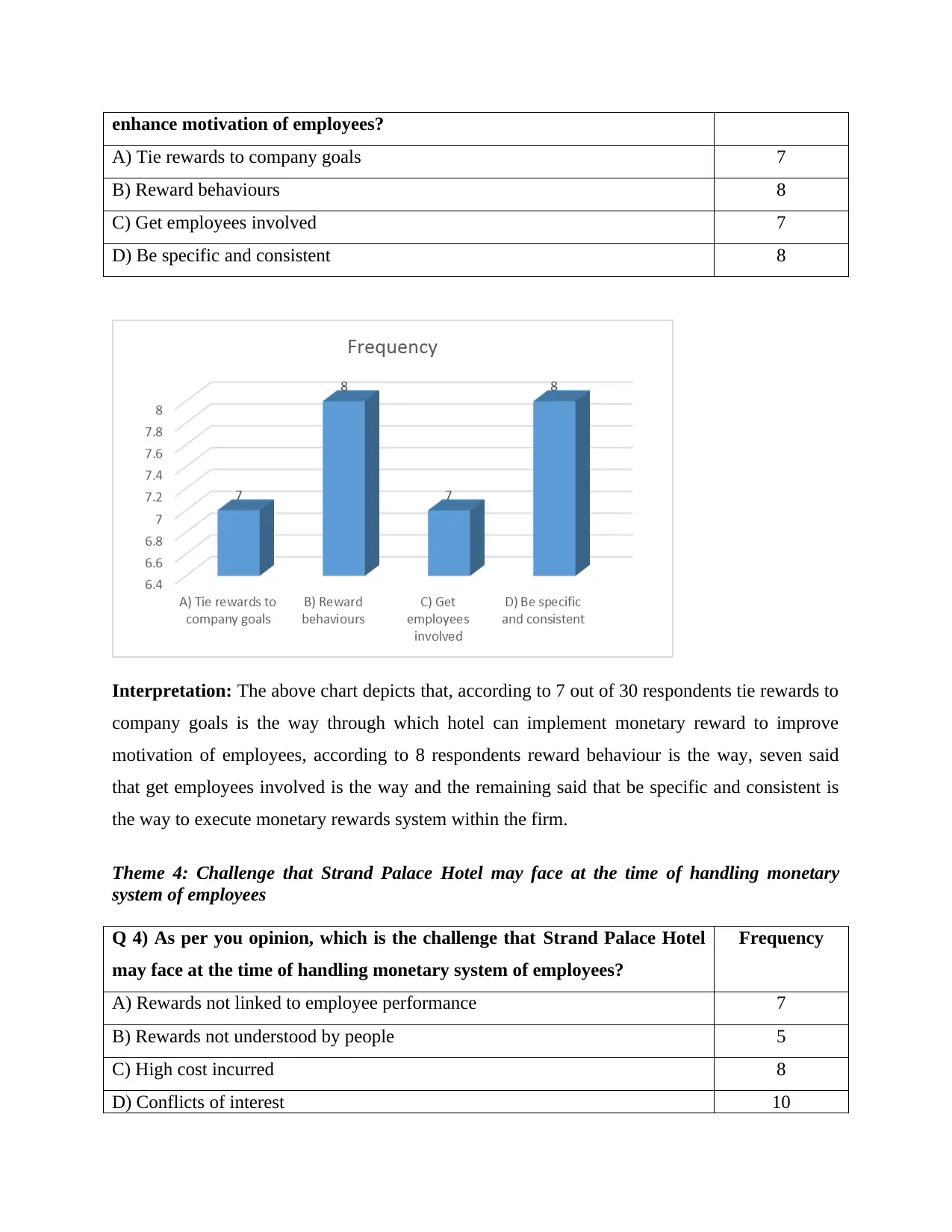
enhance motivation of employees?
A) Tie rewards to company goals 7
B) Reward behaviours 8
C) Get employees involved 7
D) Be specific and consistent 8
Interpretation: The above chart depicts that, according to 7 out of 30 respondents tie rewards to
company goals is the way through which hotel can implement monetary reward to improve
motivation of employees, according to 8 respondents reward behaviour is the way, seven said
that get employees involved is the way and the remaining said that be specific and consistent is
the way to execute monetary rewards system within the firm.
Theme 4: Challenge that Strand Palace Hotel may face at the time of handling monetary
system of employees
Q 4) As per you opinion, which is the challenge that Strand Palace Hotel
may face at the time of handling monetary system of employees?
Frequency
A) Rewards not linked to employee performance 7
B) Rewards not understood by people 5
C) High cost incurred 8
D) Conflicts of interest 10
A) Tie rewards to company goals 7
B) Reward behaviours 8
C) Get employees involved 7
D) Be specific and consistent 8
Interpretation: The above chart depicts that, according to 7 out of 30 respondents tie rewards to
company goals is the way through which hotel can implement monetary reward to improve
motivation of employees, according to 8 respondents reward behaviour is the way, seven said
that get employees involved is the way and the remaining said that be specific and consistent is
the way to execute monetary rewards system within the firm.
Theme 4: Challenge that Strand Palace Hotel may face at the time of handling monetary
system of employees
Q 4) As per you opinion, which is the challenge that Strand Palace Hotel
may face at the time of handling monetary system of employees?
Frequency
A) Rewards not linked to employee performance 7
B) Rewards not understood by people 5
C) High cost incurred 8
D) Conflicts of interest 10
Secure Best Marks with AI Grader
Need help grading? Try our AI Grader for instant feedback on your assignments.
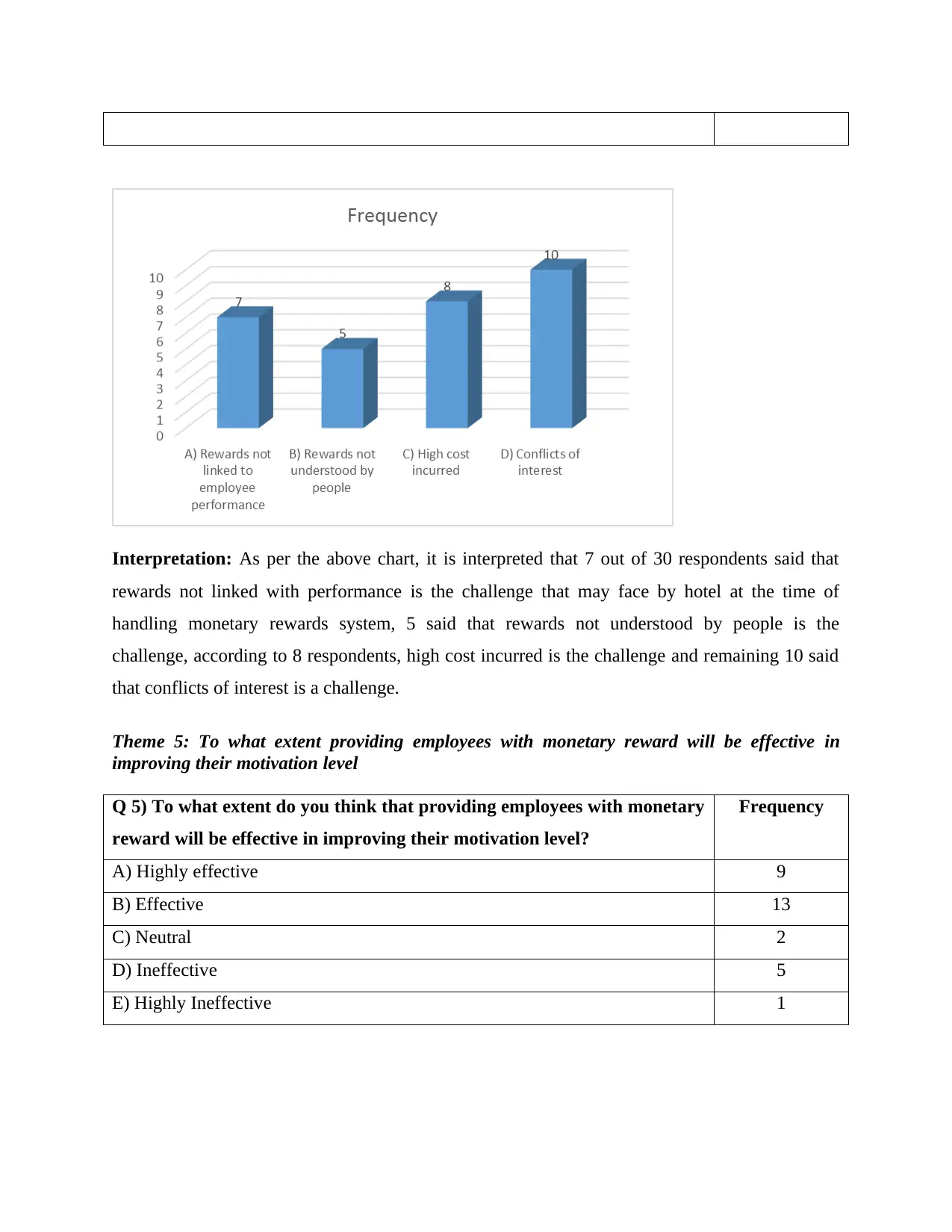
Interpretation: As per the above chart, it is interpreted that 7 out of 30 respondents said that
rewards not linked with performance is the challenge that may face by hotel at the time of
handling monetary rewards system, 5 said that rewards not understood by people is the
challenge, according to 8 respondents, high cost incurred is the challenge and remaining 10 said
that conflicts of interest is a challenge.
Theme 5: To what extent providing employees with monetary reward will be effective in
improving their motivation level
Q 5) To what extent do you think that providing employees with monetary
reward will be effective in improving their motivation level?
Frequency
A) Highly effective 9
B) Effective 13
C) Neutral 2
D) Ineffective 5
E) Highly Ineffective 1
rewards not linked with performance is the challenge that may face by hotel at the time of
handling monetary rewards system, 5 said that rewards not understood by people is the
challenge, according to 8 respondents, high cost incurred is the challenge and remaining 10 said
that conflicts of interest is a challenge.
Theme 5: To what extent providing employees with monetary reward will be effective in
improving their motivation level
Q 5) To what extent do you think that providing employees with monetary
reward will be effective in improving their motivation level?
Frequency
A) Highly effective 9
B) Effective 13
C) Neutral 2
D) Ineffective 5
E) Highly Ineffective 1
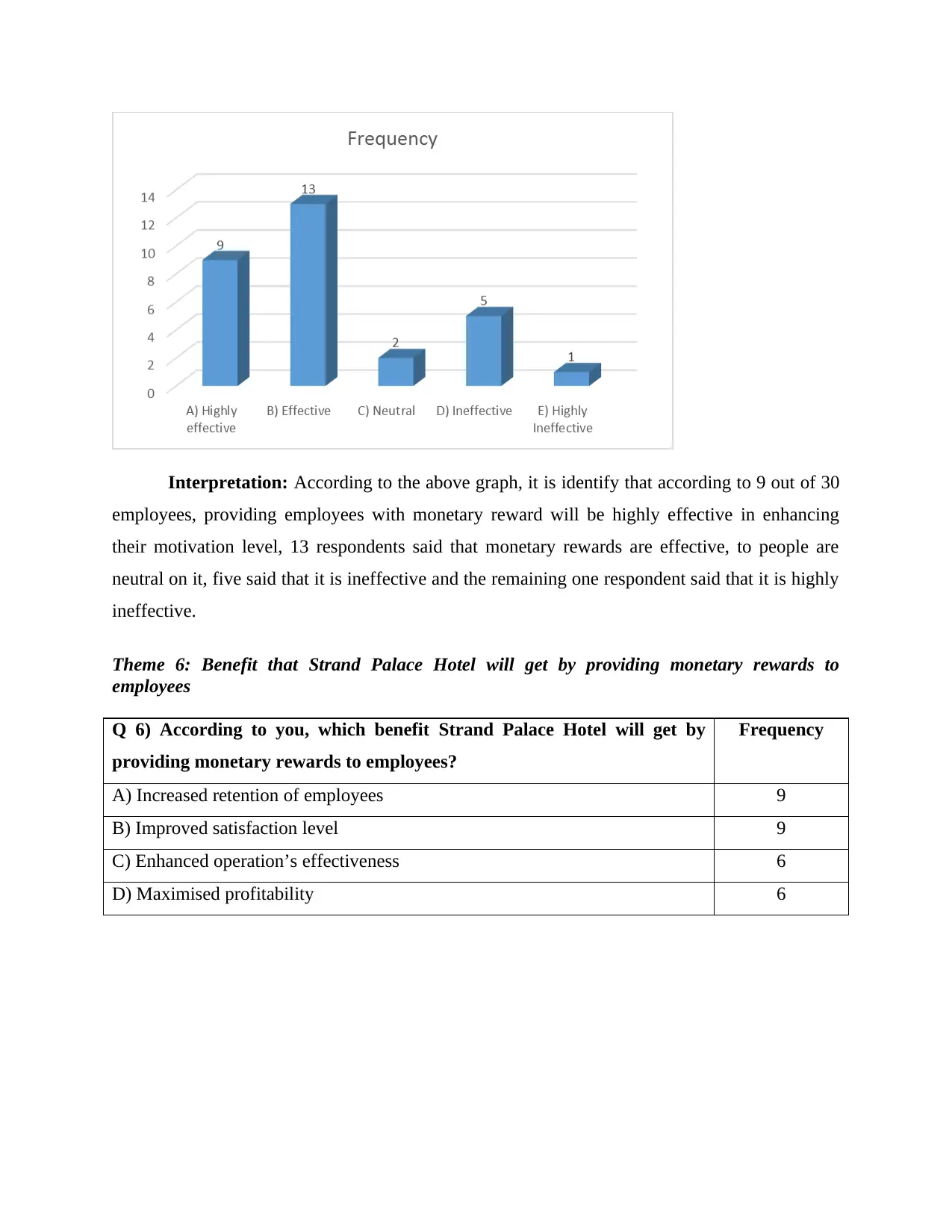
Interpretation: According to the above graph, it is identify that according to 9 out of 30
employees, providing employees with monetary reward will be highly effective in enhancing
their motivation level, 13 respondents said that monetary rewards are effective, to people are
neutral on it, five said that it is ineffective and the remaining one respondent said that it is highly
ineffective.
Theme 6: Benefit that Strand Palace Hotel will get by providing monetary rewards to
employees
Q 6) According to you, which benefit Strand Palace Hotel will get by
providing monetary rewards to employees?
Frequency
A) Increased retention of employees 9
B) Improved satisfaction level 9
C) Enhanced operation’s effectiveness 6
D) Maximised profitability 6
employees, providing employees with monetary reward will be highly effective in enhancing
their motivation level, 13 respondents said that monetary rewards are effective, to people are
neutral on it, five said that it is ineffective and the remaining one respondent said that it is highly
ineffective.
Theme 6: Benefit that Strand Palace Hotel will get by providing monetary rewards to
employees
Q 6) According to you, which benefit Strand Palace Hotel will get by
providing monetary rewards to employees?
Frequency
A) Increased retention of employees 9
B) Improved satisfaction level 9
C) Enhanced operation’s effectiveness 6
D) Maximised profitability 6
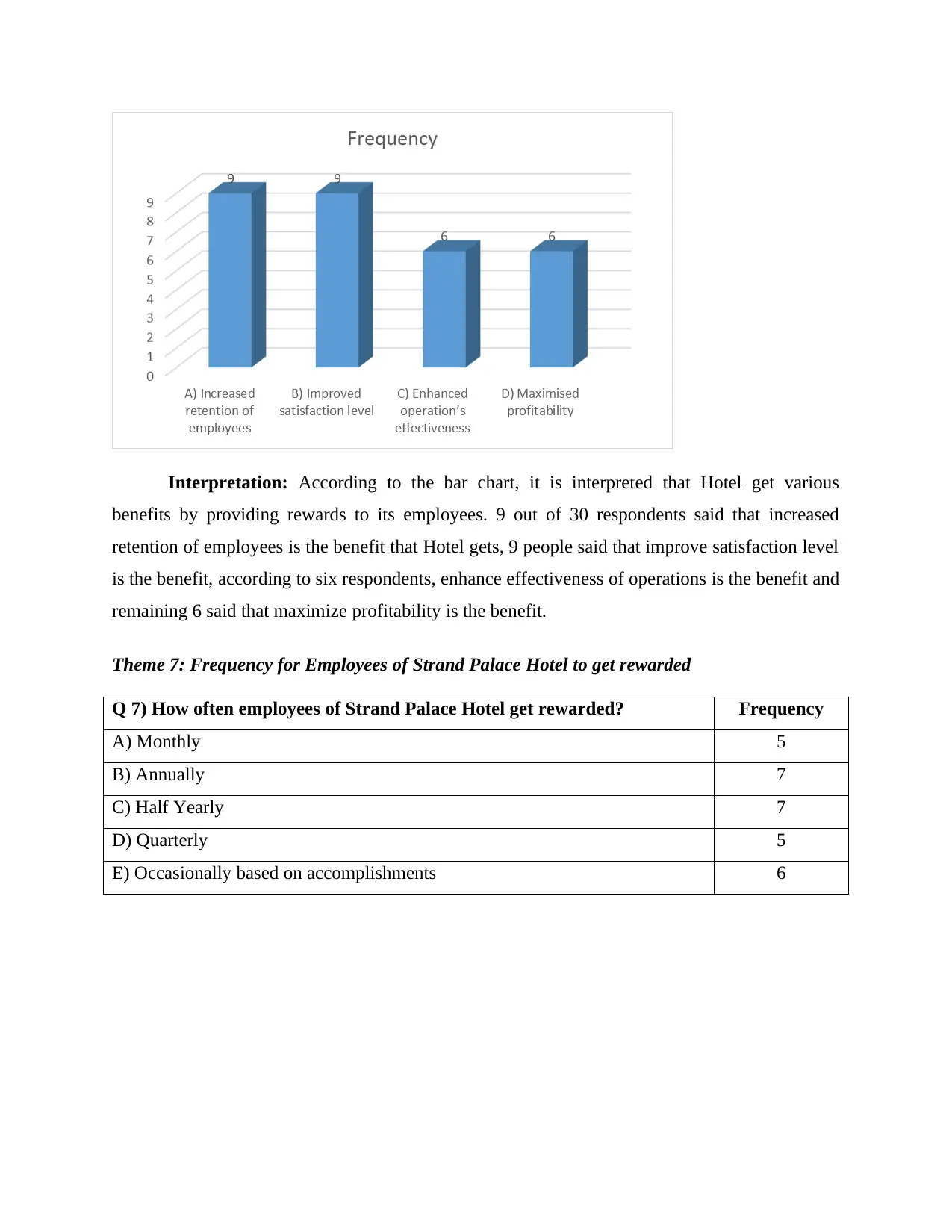
Interpretation: According to the bar chart, it is interpreted that Hotel get various
benefits by providing rewards to its employees. 9 out of 30 respondents said that increased
retention of employees is the benefit that Hotel gets, 9 people said that improve satisfaction level
is the benefit, according to six respondents, enhance effectiveness of operations is the benefit and
remaining 6 said that maximize profitability is the benefit.
Theme 7: Frequency for Employees of Strand Palace Hotel to get rewarded
Q 7) How often employees of Strand Palace Hotel get rewarded? Frequency
A) Monthly 5
B) Annually 7
C) Half Yearly 7
D) Quarterly 5
E) Occasionally based on accomplishments 6
benefits by providing rewards to its employees. 9 out of 30 respondents said that increased
retention of employees is the benefit that Hotel gets, 9 people said that improve satisfaction level
is the benefit, according to six respondents, enhance effectiveness of operations is the benefit and
remaining 6 said that maximize profitability is the benefit.
Theme 7: Frequency for Employees of Strand Palace Hotel to get rewarded
Q 7) How often employees of Strand Palace Hotel get rewarded? Frequency
A) Monthly 5
B) Annually 7
C) Half Yearly 7
D) Quarterly 5
E) Occasionally based on accomplishments 6
Paraphrase This Document
Need a fresh take? Get an instant paraphrase of this document with our AI Paraphraser
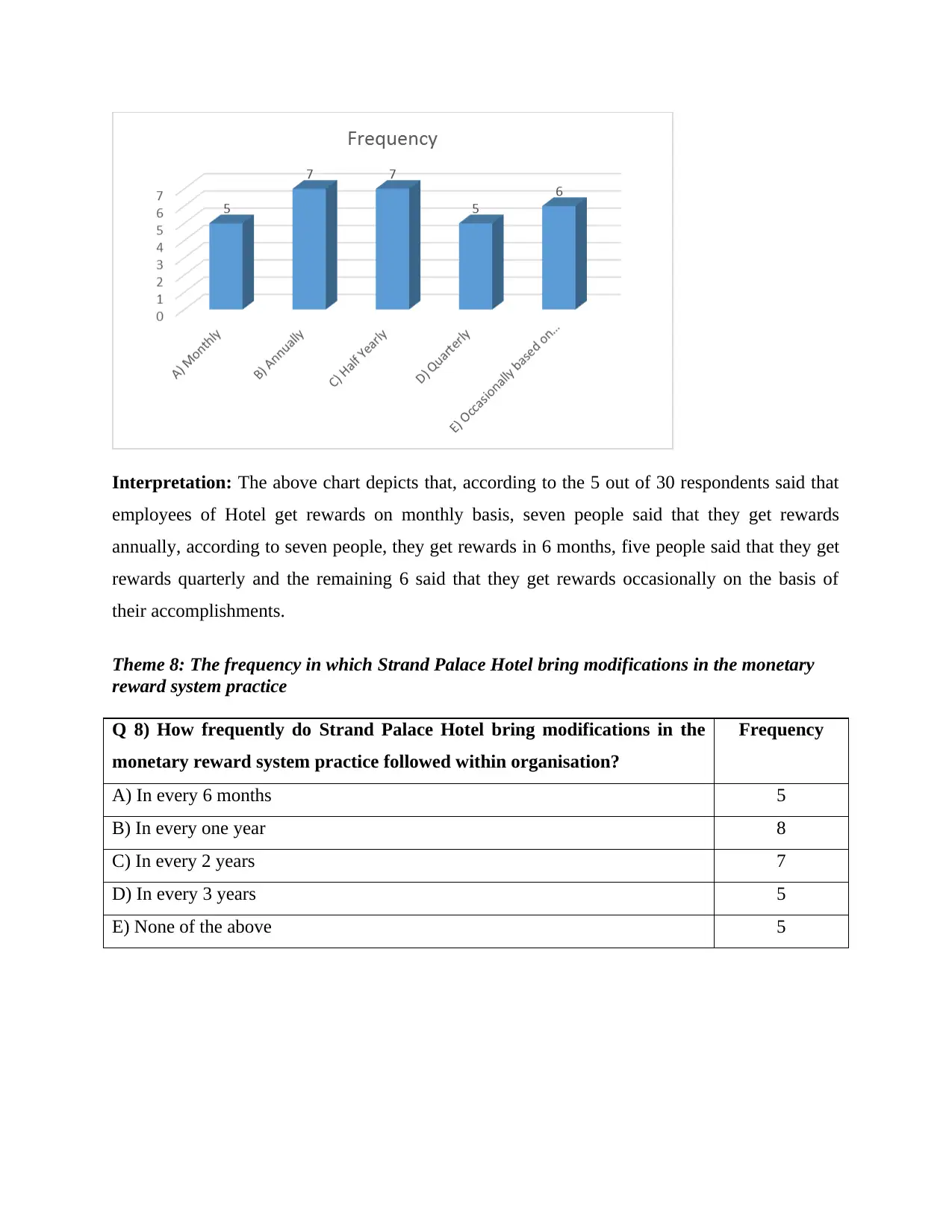
Interpretation: The above chart depicts that, according to the 5 out of 30 respondents said that
employees of Hotel get rewards on monthly basis, seven people said that they get rewards
annually, according to seven people, they get rewards in 6 months, five people said that they get
rewards quarterly and the remaining 6 said that they get rewards occasionally on the basis of
their accomplishments.
Theme 8: The frequency in which Strand Palace Hotel bring modifications in the monetary
reward system practice
Q 8) How frequently do Strand Palace Hotel bring modifications in the
monetary reward system practice followed within organisation?
Frequency
A) In every 6 months 5
B) In every one year 8
C) In every 2 years 7
D) In every 3 years 5
E) None of the above 5
employees of Hotel get rewards on monthly basis, seven people said that they get rewards
annually, according to seven people, they get rewards in 6 months, five people said that they get
rewards quarterly and the remaining 6 said that they get rewards occasionally on the basis of
their accomplishments.
Theme 8: The frequency in which Strand Palace Hotel bring modifications in the monetary
reward system practice
Q 8) How frequently do Strand Palace Hotel bring modifications in the
monetary reward system practice followed within organisation?
Frequency
A) In every 6 months 5
B) In every one year 8
C) In every 2 years 7
D) In every 3 years 5
E) None of the above 5
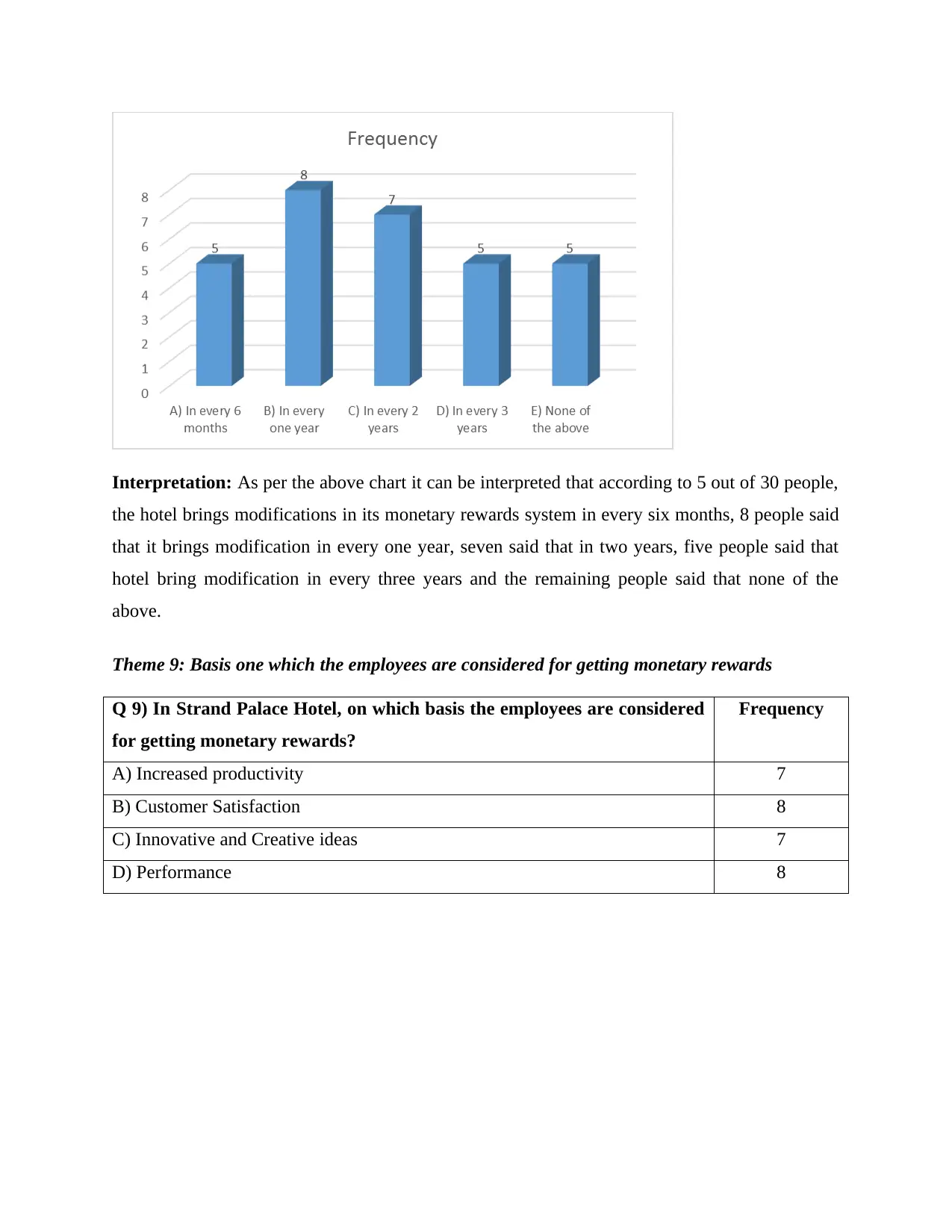
Interpretation: As per the above chart it can be interpreted that according to 5 out of 30 people,
the hotel brings modifications in its monetary rewards system in every six months, 8 people said
that it brings modification in every one year, seven said that in two years, five people said that
hotel bring modification in every three years and the remaining people said that none of the
above.
Theme 9: Basis one which the employees are considered for getting monetary rewards
Q 9) In Strand Palace Hotel, on which basis the employees are considered
for getting monetary rewards?
Frequency
A) Increased productivity 7
B) Customer Satisfaction 8
C) Innovative and Creative ideas 7
D) Performance 8
the hotel brings modifications in its monetary rewards system in every six months, 8 people said
that it brings modification in every one year, seven said that in two years, five people said that
hotel bring modification in every three years and the remaining people said that none of the
above.
Theme 9: Basis one which the employees are considered for getting monetary rewards
Q 9) In Strand Palace Hotel, on which basis the employees are considered
for getting monetary rewards?
Frequency
A) Increased productivity 7
B) Customer Satisfaction 8
C) Innovative and Creative ideas 7
D) Performance 8
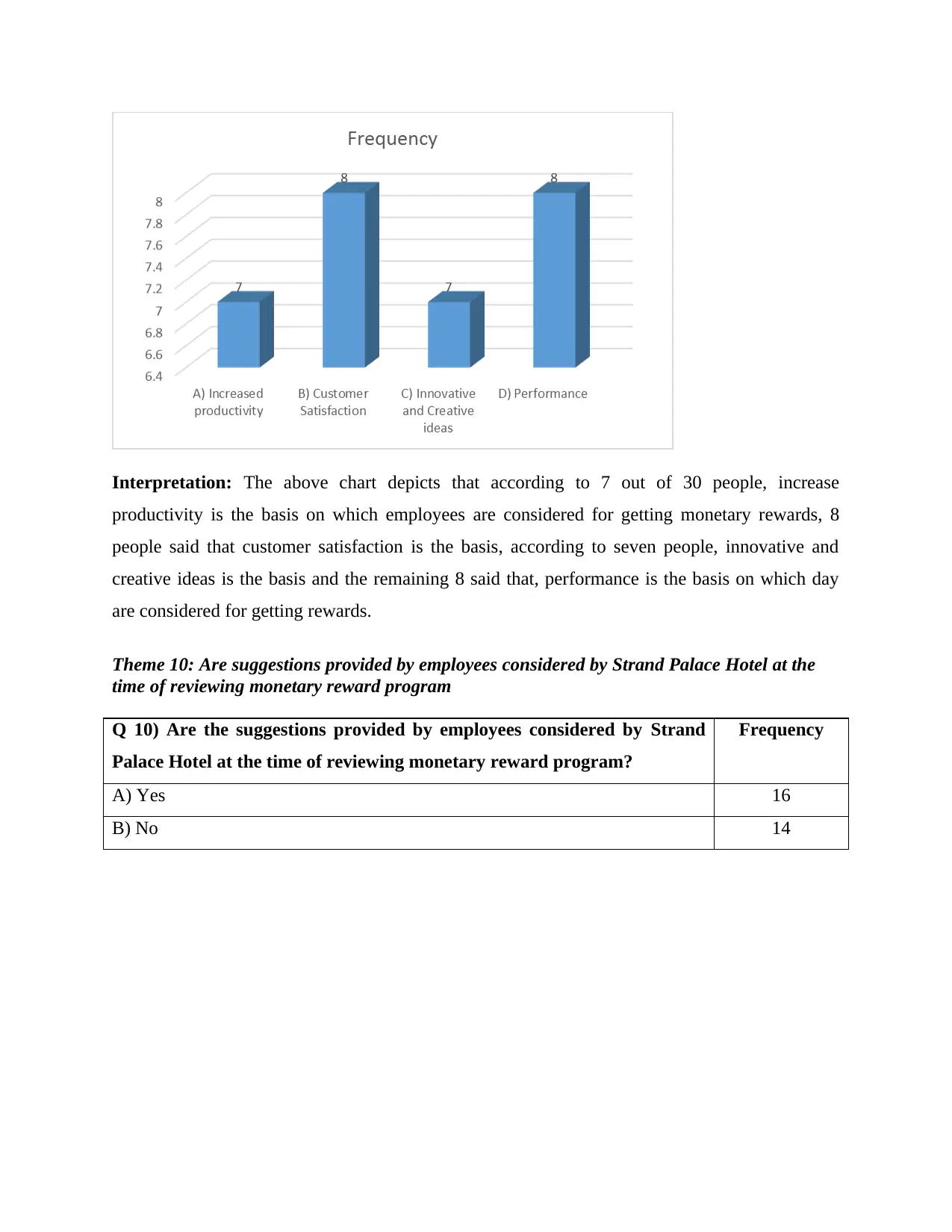
Interpretation: The above chart depicts that according to 7 out of 30 people, increase
productivity is the basis on which employees are considered for getting monetary rewards, 8
people said that customer satisfaction is the basis, according to seven people, innovative and
creative ideas is the basis and the remaining 8 said that, performance is the basis on which day
are considered for getting rewards.
Theme 10: Are suggestions provided by employees considered by Strand Palace Hotel at the
time of reviewing monetary reward program
Q 10) Are the suggestions provided by employees considered by Strand
Palace Hotel at the time of reviewing monetary reward program?
Frequency
A) Yes 16
B) No 14
productivity is the basis on which employees are considered for getting monetary rewards, 8
people said that customer satisfaction is the basis, according to seven people, innovative and
creative ideas is the basis and the remaining 8 said that, performance is the basis on which day
are considered for getting rewards.
Theme 10: Are suggestions provided by employees considered by Strand Palace Hotel at the
time of reviewing monetary reward program
Q 10) Are the suggestions provided by employees considered by Strand
Palace Hotel at the time of reviewing monetary reward program?
Frequency
A) Yes 16
B) No 14
Secure Best Marks with AI Grader
Need help grading? Try our AI Grader for instant feedback on your assignments.
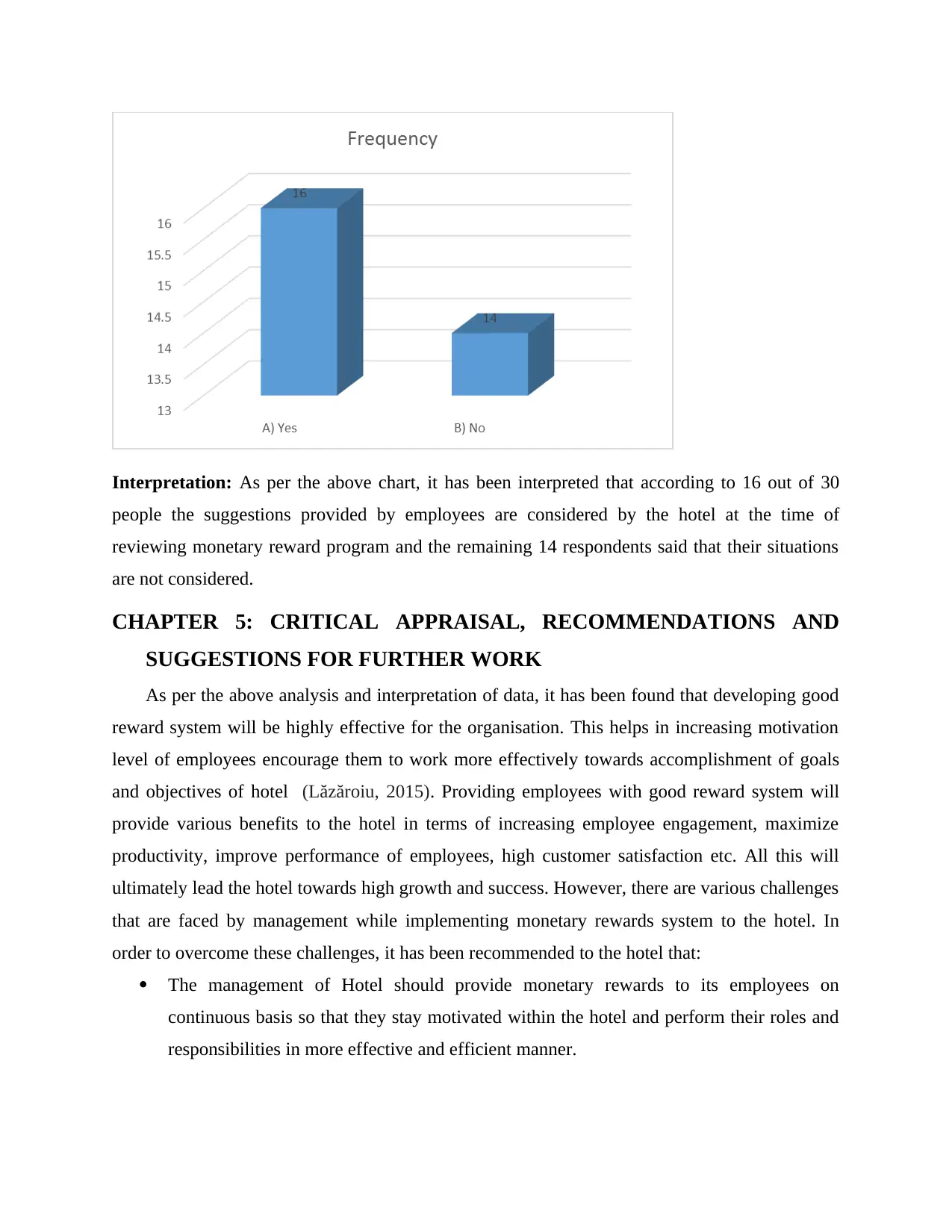
Interpretation: As per the above chart, it has been interpreted that according to 16 out of 30
people the suggestions provided by employees are considered by the hotel at the time of
reviewing monetary reward program and the remaining 14 respondents said that their situations
are not considered.
CHAPTER 5: CRITICAL APPRAISAL, RECOMMENDATIONS AND
SUGGESTIONS FOR FURTHER WORK
As per the above analysis and interpretation of data, it has been found that developing good
reward system will be highly effective for the organisation. This helps in increasing motivation
level of employees encourage them to work more effectively towards accomplishment of goals
and objectives of hotel (Lăzăroiu, 2015). Providing employees with good reward system will
provide various benefits to the hotel in terms of increasing employee engagement, maximize
productivity, improve performance of employees, high customer satisfaction etc. All this will
ultimately lead the hotel towards high growth and success. However, there are various challenges
that are faced by management while implementing monetary rewards system to the hotel. In
order to overcome these challenges, it has been recommended to the hotel that:
The management of Hotel should provide monetary rewards to its employees on
continuous basis so that they stay motivated within the hotel and perform their roles and
responsibilities in more effective and efficient manner.
people the suggestions provided by employees are considered by the hotel at the time of
reviewing monetary reward program and the remaining 14 respondents said that their situations
are not considered.
CHAPTER 5: CRITICAL APPRAISAL, RECOMMENDATIONS AND
SUGGESTIONS FOR FURTHER WORK
As per the above analysis and interpretation of data, it has been found that developing good
reward system will be highly effective for the organisation. This helps in increasing motivation
level of employees encourage them to work more effectively towards accomplishment of goals
and objectives of hotel (Lăzăroiu, 2015). Providing employees with good reward system will
provide various benefits to the hotel in terms of increasing employee engagement, maximize
productivity, improve performance of employees, high customer satisfaction etc. All this will
ultimately lead the hotel towards high growth and success. However, there are various challenges
that are faced by management while implementing monetary rewards system to the hotel. In
order to overcome these challenges, it has been recommended to the hotel that:
The management of Hotel should provide monetary rewards to its employees on
continuous basis so that they stay motivated within the hotel and perform their roles and
responsibilities in more effective and efficient manner.
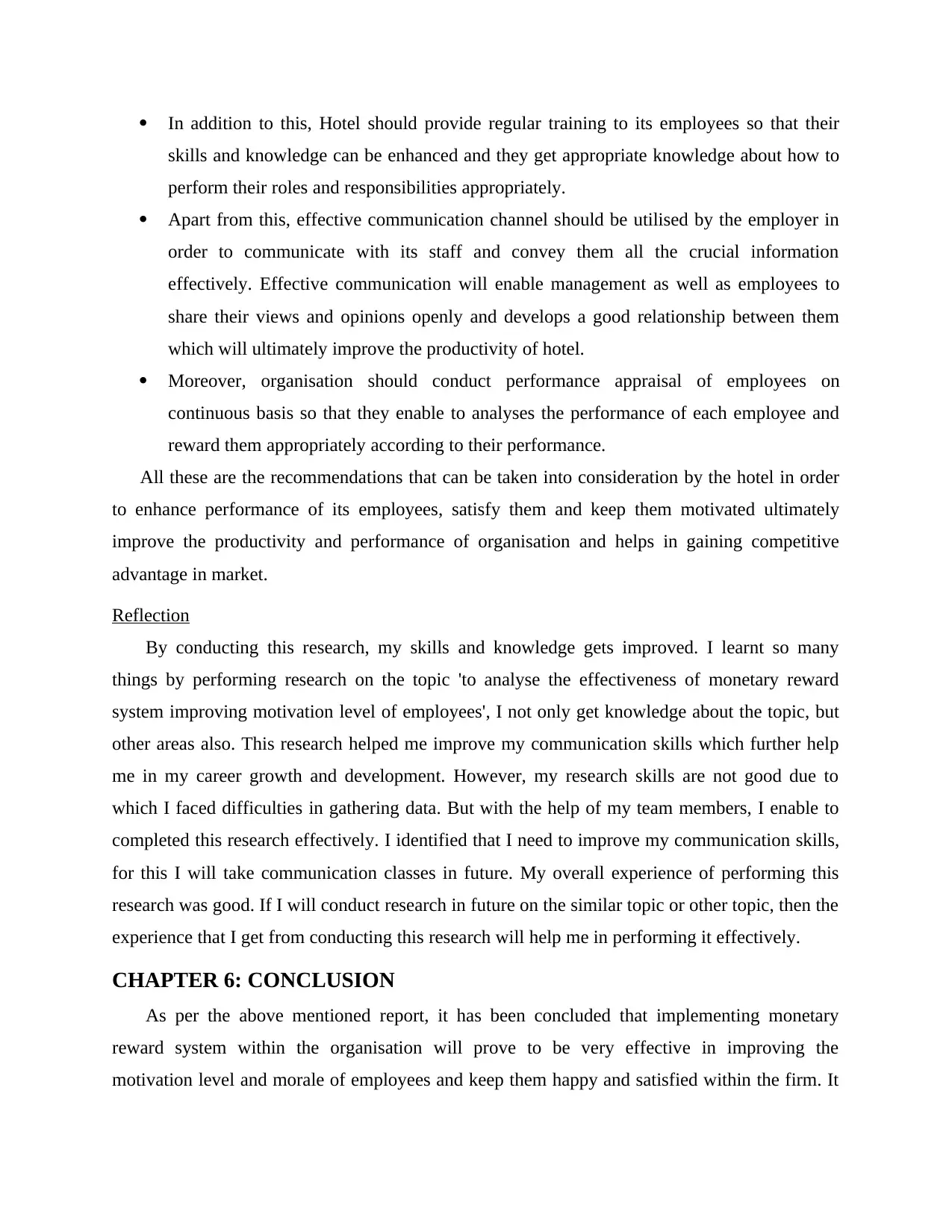
In addition to this, Hotel should provide regular training to its employees so that their
skills and knowledge can be enhanced and they get appropriate knowledge about how to
perform their roles and responsibilities appropriately.
Apart from this, effective communication channel should be utilised by the employer in
order to communicate with its staff and convey them all the crucial information
effectively. Effective communication will enable management as well as employees to
share their views and opinions openly and develops a good relationship between them
which will ultimately improve the productivity of hotel.
Moreover, organisation should conduct performance appraisal of employees on
continuous basis so that they enable to analyses the performance of each employee and
reward them appropriately according to their performance.
All these are the recommendations that can be taken into consideration by the hotel in order
to enhance performance of its employees, satisfy them and keep them motivated ultimately
improve the productivity and performance of organisation and helps in gaining competitive
advantage in market.
Reflection
By conducting this research, my skills and knowledge gets improved. I learnt so many
things by performing research on the topic 'to analyse the effectiveness of monetary reward
system improving motivation level of employees', I not only get knowledge about the topic, but
other areas also. This research helped me improve my communication skills which further help
me in my career growth and development. However, my research skills are not good due to
which I faced difficulties in gathering data. But with the help of my team members, I enable to
completed this research effectively. I identified that I need to improve my communication skills,
for this I will take communication classes in future. My overall experience of performing this
research was good. If I will conduct research in future on the similar topic or other topic, then the
experience that I get from conducting this research will help me in performing it effectively.
CHAPTER 6: CONCLUSION
As per the above mentioned report, it has been concluded that implementing monetary
reward system within the organisation will prove to be very effective in improving the
motivation level and morale of employees and keep them happy and satisfied within the firm. It
skills and knowledge can be enhanced and they get appropriate knowledge about how to
perform their roles and responsibilities appropriately.
Apart from this, effective communication channel should be utilised by the employer in
order to communicate with its staff and convey them all the crucial information
effectively. Effective communication will enable management as well as employees to
share their views and opinions openly and develops a good relationship between them
which will ultimately improve the productivity of hotel.
Moreover, organisation should conduct performance appraisal of employees on
continuous basis so that they enable to analyses the performance of each employee and
reward them appropriately according to their performance.
All these are the recommendations that can be taken into consideration by the hotel in order
to enhance performance of its employees, satisfy them and keep them motivated ultimately
improve the productivity and performance of organisation and helps in gaining competitive
advantage in market.
Reflection
By conducting this research, my skills and knowledge gets improved. I learnt so many
things by performing research on the topic 'to analyse the effectiveness of monetary reward
system improving motivation level of employees', I not only get knowledge about the topic, but
other areas also. This research helped me improve my communication skills which further help
me in my career growth and development. However, my research skills are not good due to
which I faced difficulties in gathering data. But with the help of my team members, I enable to
completed this research effectively. I identified that I need to improve my communication skills,
for this I will take communication classes in future. My overall experience of performing this
research was good. If I will conduct research in future on the similar topic or other topic, then the
experience that I get from conducting this research will help me in performing it effectively.
CHAPTER 6: CONCLUSION
As per the above mentioned report, it has been concluded that implementing monetary
reward system within the organisation will prove to be very effective in improving the
motivation level and morale of employees and keep them happy and satisfied within the firm. It
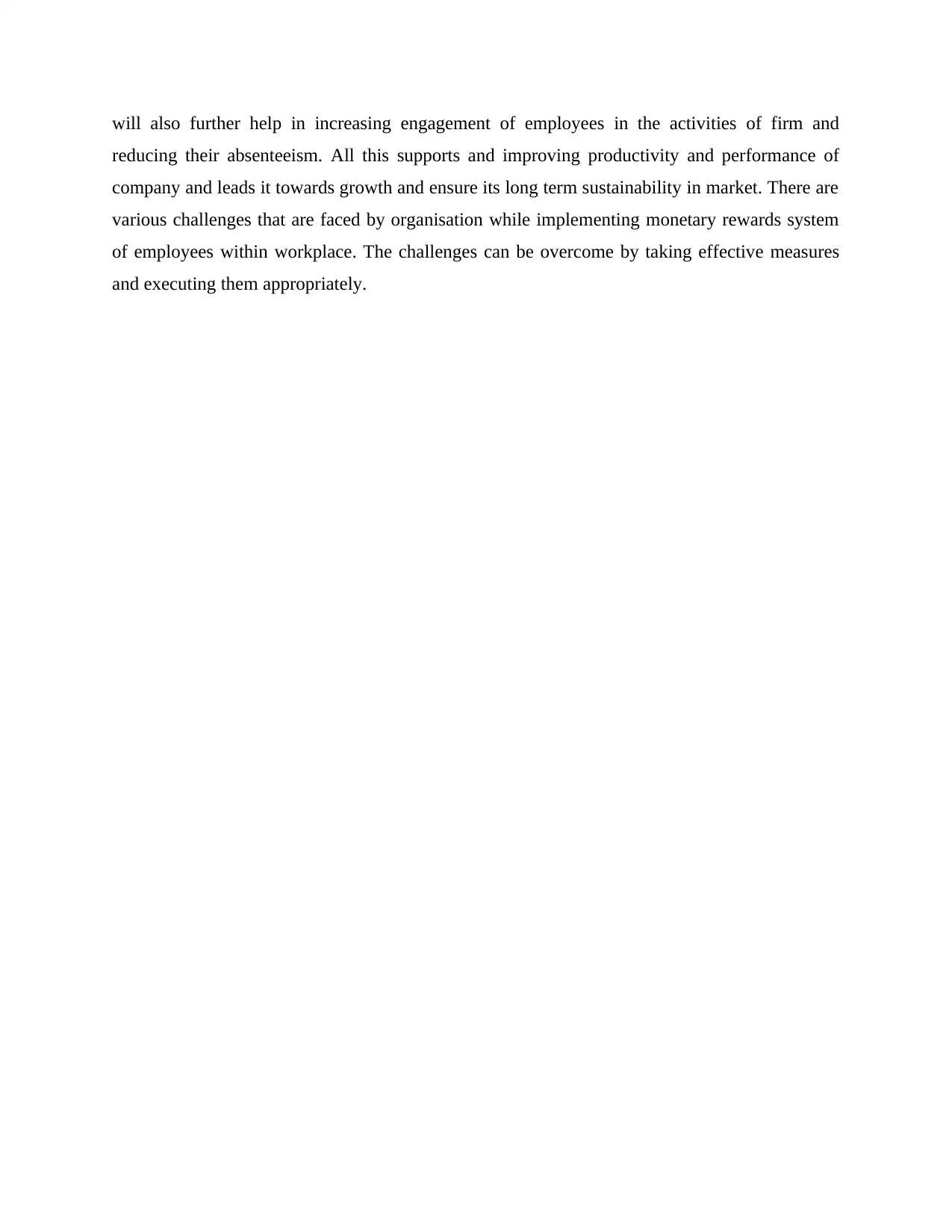
will also further help in increasing engagement of employees in the activities of firm and
reducing their absenteeism. All this supports and improving productivity and performance of
company and leads it towards growth and ensure its long term sustainability in market. There are
various challenges that are faced by organisation while implementing monetary rewards system
of employees within workplace. The challenges can be overcome by taking effective measures
and executing them appropriately.
reducing their absenteeism. All this supports and improving productivity and performance of
company and leads it towards growth and ensure its long term sustainability in market. There are
various challenges that are faced by organisation while implementing monetary rewards system
of employees within workplace. The challenges can be overcome by taking effective measures
and executing them appropriately.
Paraphrase This Document
Need a fresh take? Get an instant paraphrase of this document with our AI Paraphraser
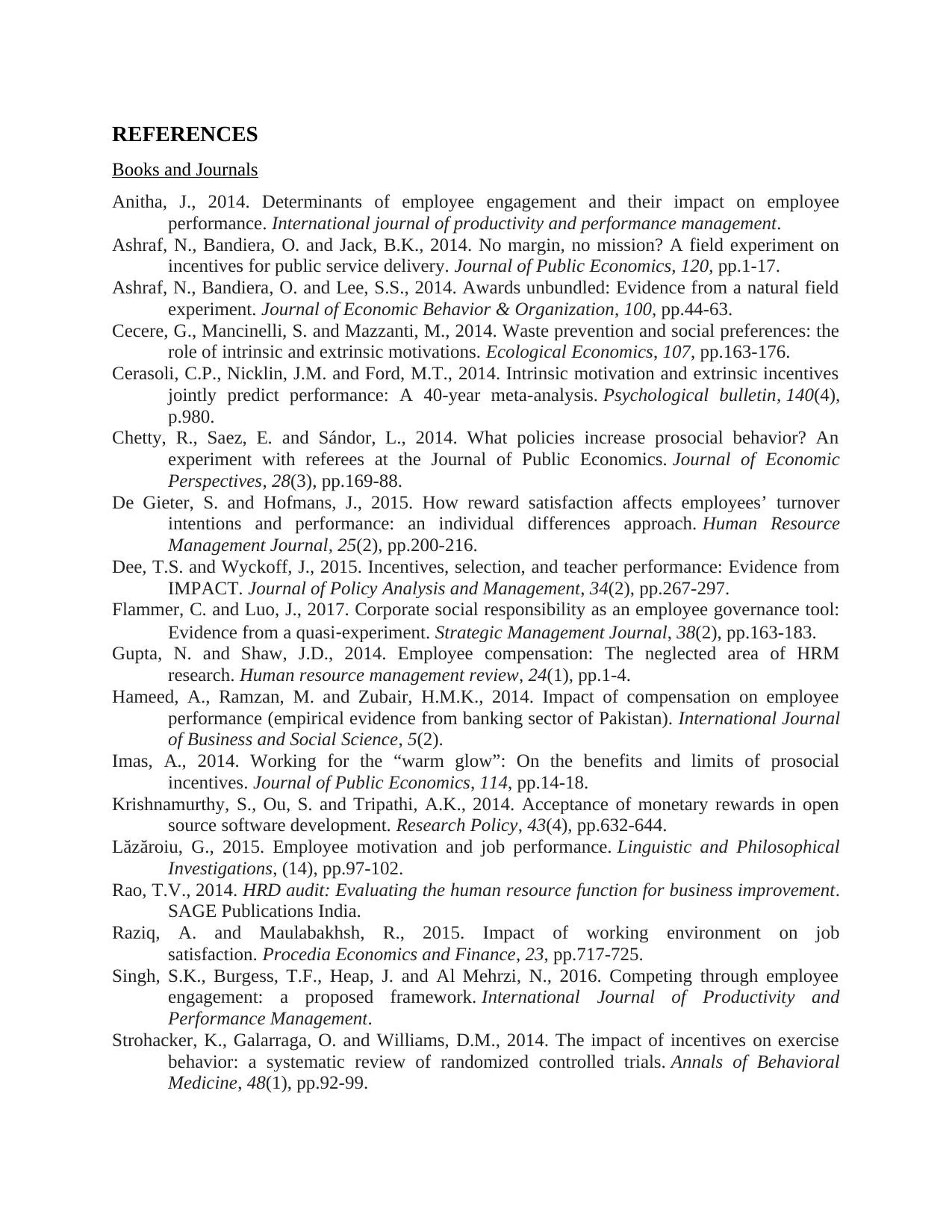
REFERENCES
Books and Journals
Anitha, J., 2014. Determinants of employee engagement and their impact on employee
performance. International journal of productivity and performance management.
Ashraf, N., Bandiera, O. and Jack, B.K., 2014. No margin, no mission? A field experiment on
incentives for public service delivery. Journal of Public Economics, 120, pp.1-17.
Ashraf, N., Bandiera, O. and Lee, S.S., 2014. Awards unbundled: Evidence from a natural field
experiment. Journal of Economic Behavior & Organization, 100, pp.44-63.
Cecere, G., Mancinelli, S. and Mazzanti, M., 2014. Waste prevention and social preferences: the
role of intrinsic and extrinsic motivations. Ecological Economics, 107, pp.163-176.
Cerasoli, C.P., Nicklin, J.M. and Ford, M.T., 2014. Intrinsic motivation and extrinsic incentives
jointly predict performance: A 40-year meta-analysis. Psychological bulletin, 140(4),
p.980.
Chetty, R., Saez, E. and Sándor, L., 2014. What policies increase prosocial behavior? An
experiment with referees at the Journal of Public Economics. Journal of Economic
Perspectives, 28(3), pp.169-88.
De Gieter, S. and Hofmans, J., 2015. How reward satisfaction affects employees’ turnover
intentions and performance: an individual differences approach. Human Resource
Management Journal, 25(2), pp.200-216.
Dee, T.S. and Wyckoff, J., 2015. Incentives, selection, and teacher performance: Evidence from
IMPACT. Journal of Policy Analysis and Management, 34(2), pp.267-297.
Flammer, C. and Luo, J., 2017. Corporate social responsibility as an employee governance tool:
Evidence from a quasi‐experiment. Strategic Management Journal, 38(2), pp.163-183.
Gupta, N. and Shaw, J.D., 2014. Employee compensation: The neglected area of HRM
research. Human resource management review, 24(1), pp.1-4.
Hameed, A., Ramzan, M. and Zubair, H.M.K., 2014. Impact of compensation on employee
performance (empirical evidence from banking sector of Pakistan). International Journal
of Business and Social Science, 5(2).
Imas, A., 2014. Working for the “warm glow”: On the benefits and limits of prosocial
incentives. Journal of Public Economics, 114, pp.14-18.
Krishnamurthy, S., Ou, S. and Tripathi, A.K., 2014. Acceptance of monetary rewards in open
source software development. Research Policy, 43(4), pp.632-644.
Lăzăroiu, G., 2015. Employee motivation and job performance. Linguistic and Philosophical
Investigations, (14), pp.97-102.
Rao, T.V., 2014. HRD audit: Evaluating the human resource function for business improvement.
SAGE Publications India.
Raziq, A. and Maulabakhsh, R., 2015. Impact of working environment on job
satisfaction. Procedia Economics and Finance, 23, pp.717-725.
Singh, S.K., Burgess, T.F., Heap, J. and Al Mehrzi, N., 2016. Competing through employee
engagement: a proposed framework. International Journal of Productivity and
Performance Management.
Strohacker, K., Galarraga, O. and Williams, D.M., 2014. The impact of incentives on exercise
behavior: a systematic review of randomized controlled trials. Annals of Behavioral
Medicine, 48(1), pp.92-99.
Books and Journals
Anitha, J., 2014. Determinants of employee engagement and their impact on employee
performance. International journal of productivity and performance management.
Ashraf, N., Bandiera, O. and Jack, B.K., 2014. No margin, no mission? A field experiment on
incentives for public service delivery. Journal of Public Economics, 120, pp.1-17.
Ashraf, N., Bandiera, O. and Lee, S.S., 2014. Awards unbundled: Evidence from a natural field
experiment. Journal of Economic Behavior & Organization, 100, pp.44-63.
Cecere, G., Mancinelli, S. and Mazzanti, M., 2014. Waste prevention and social preferences: the
role of intrinsic and extrinsic motivations. Ecological Economics, 107, pp.163-176.
Cerasoli, C.P., Nicklin, J.M. and Ford, M.T., 2014. Intrinsic motivation and extrinsic incentives
jointly predict performance: A 40-year meta-analysis. Psychological bulletin, 140(4),
p.980.
Chetty, R., Saez, E. and Sándor, L., 2014. What policies increase prosocial behavior? An
experiment with referees at the Journal of Public Economics. Journal of Economic
Perspectives, 28(3), pp.169-88.
De Gieter, S. and Hofmans, J., 2015. How reward satisfaction affects employees’ turnover
intentions and performance: an individual differences approach. Human Resource
Management Journal, 25(2), pp.200-216.
Dee, T.S. and Wyckoff, J., 2015. Incentives, selection, and teacher performance: Evidence from
IMPACT. Journal of Policy Analysis and Management, 34(2), pp.267-297.
Flammer, C. and Luo, J., 2017. Corporate social responsibility as an employee governance tool:
Evidence from a quasi‐experiment. Strategic Management Journal, 38(2), pp.163-183.
Gupta, N. and Shaw, J.D., 2014. Employee compensation: The neglected area of HRM
research. Human resource management review, 24(1), pp.1-4.
Hameed, A., Ramzan, M. and Zubair, H.M.K., 2014. Impact of compensation on employee
performance (empirical evidence from banking sector of Pakistan). International Journal
of Business and Social Science, 5(2).
Imas, A., 2014. Working for the “warm glow”: On the benefits and limits of prosocial
incentives. Journal of Public Economics, 114, pp.14-18.
Krishnamurthy, S., Ou, S. and Tripathi, A.K., 2014. Acceptance of monetary rewards in open
source software development. Research Policy, 43(4), pp.632-644.
Lăzăroiu, G., 2015. Employee motivation and job performance. Linguistic and Philosophical
Investigations, (14), pp.97-102.
Rao, T.V., 2014. HRD audit: Evaluating the human resource function for business improvement.
SAGE Publications India.
Raziq, A. and Maulabakhsh, R., 2015. Impact of working environment on job
satisfaction. Procedia Economics and Finance, 23, pp.717-725.
Singh, S.K., Burgess, T.F., Heap, J. and Al Mehrzi, N., 2016. Competing through employee
engagement: a proposed framework. International Journal of Productivity and
Performance Management.
Strohacker, K., Galarraga, O. and Williams, D.M., 2014. The impact of incentives on exercise
behavior: a systematic review of randomized controlled trials. Annals of Behavioral
Medicine, 48(1), pp.92-99.
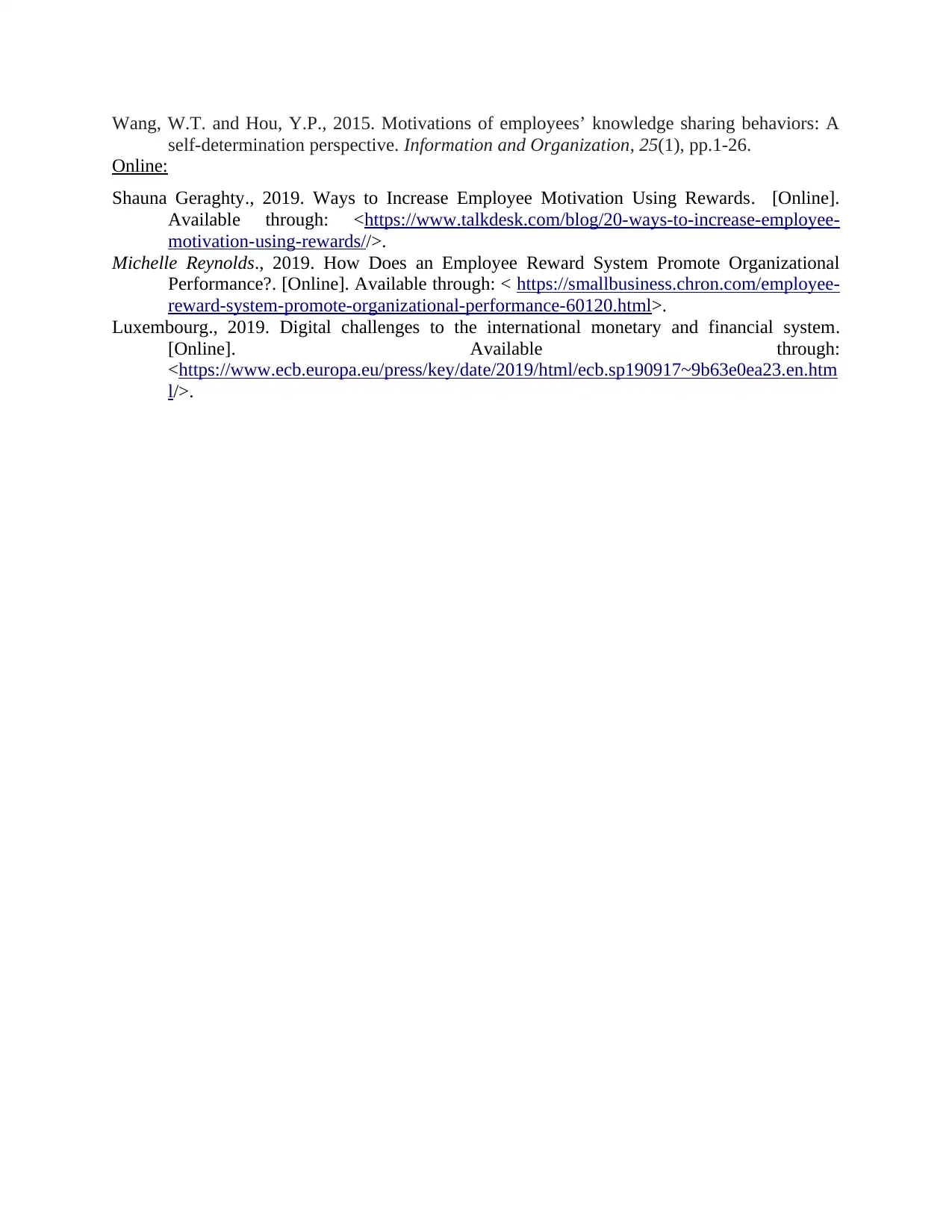
Wang, W.T. and Hou, Y.P., 2015. Motivations of employees’ knowledge sharing behaviors: A
self-determination perspective. Information and Organization, 25(1), pp.1-26.
Online:
Shauna Geraghty., 2019. Ways to Increase Employee Motivation Using Rewards. [Online].
Available through: <https://www.talkdesk.com/blog/20-ways-to-increase-employee-
motivation-using-rewards//>.
Michelle Reynolds., 2019. How Does an Employee Reward System Promote Organizational
Performance?. [Online]. Available through: < https://smallbusiness.chron.com/employee-
reward-system-promote-organizational-performance-60120.html>.
Luxembourg., 2019. Digital challenges to the international monetary and financial system.
[Online]. Available through:
<https://www.ecb.europa.eu/press/key/date/2019/html/ecb.sp190917~9b63e0ea23.en.htm
l/>.
self-determination perspective. Information and Organization, 25(1), pp.1-26.
Online:
Shauna Geraghty., 2019. Ways to Increase Employee Motivation Using Rewards. [Online].
Available through: <https://www.talkdesk.com/blog/20-ways-to-increase-employee-
motivation-using-rewards//>.
Michelle Reynolds., 2019. How Does an Employee Reward System Promote Organizational
Performance?. [Online]. Available through: < https://smallbusiness.chron.com/employee-
reward-system-promote-organizational-performance-60120.html>.
Luxembourg., 2019. Digital challenges to the international monetary and financial system.
[Online]. Available through:
<https://www.ecb.europa.eu/press/key/date/2019/html/ecb.sp190917~9b63e0ea23.en.htm
l/>.
1 out of 27
Related Documents
Your All-in-One AI-Powered Toolkit for Academic Success.
+13062052269
info@desklib.com
Available 24*7 on WhatsApp / Email
![[object Object]](/_next/static/media/star-bottom.7253800d.svg)
Unlock your academic potential
© 2024 | Zucol Services PVT LTD | All rights reserved.





